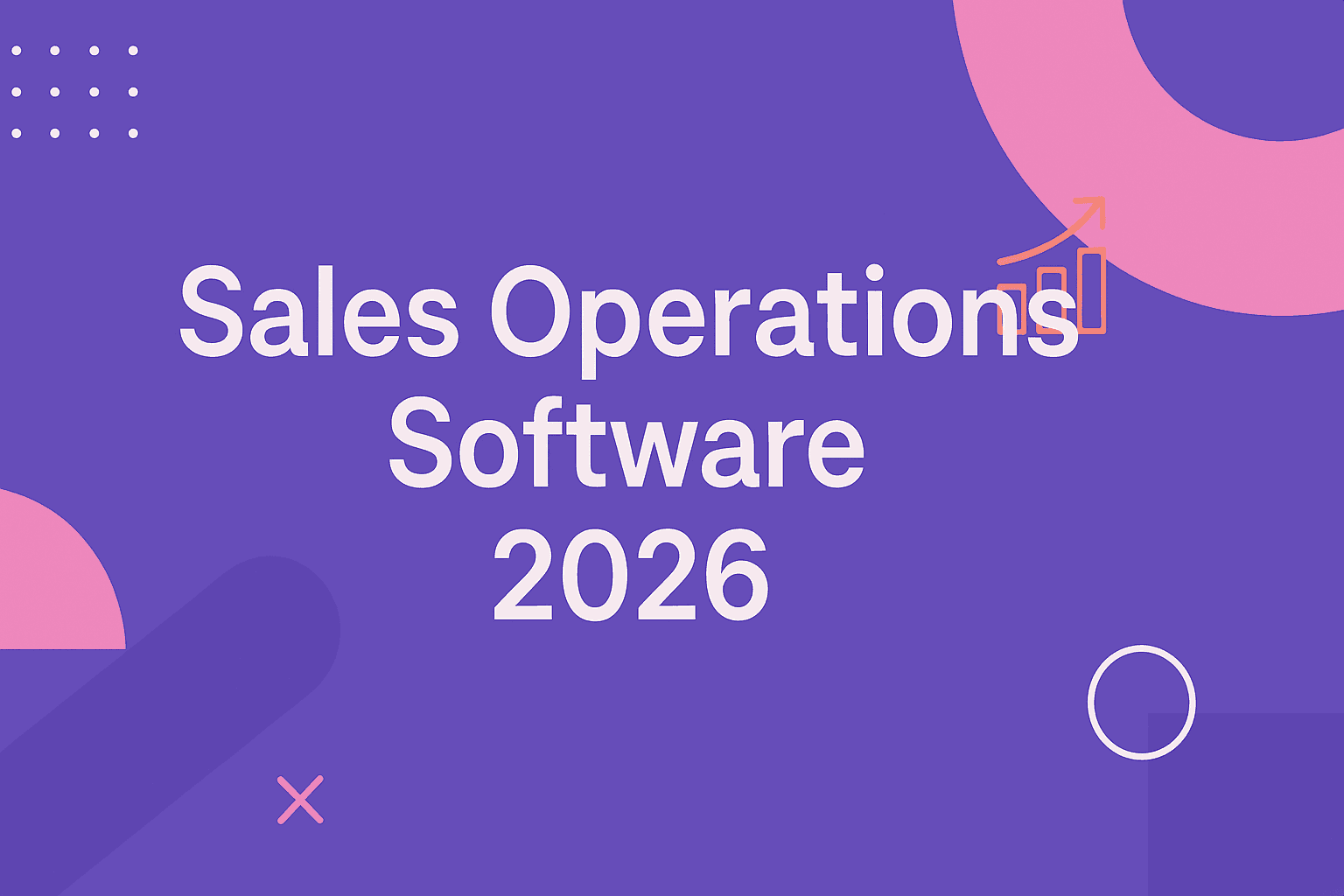
Top 15 Clari Alternatives and Competitors for 2026: Complete Guide
Dec 16, 2025
Dec 16, 2025

Dmytro Chervonyi
CMO at Forecastio
Last updated
Dec 16, 2025
Reading time
13 min
Share:
Share
Best Clari alternative for HubSpot users

In today’s fast-paced B2B environment, accurate sales forecasting and efficient revenue operations have become essential for sustainable growth. Clari Revenue Platform has become a cornerstone in revenue management, leveraging AI technologies like RevAI to provide actionable insights and streamline processes for sales, marketing, and customer success teams.
Its features enhance operational efficiency, improve forecasting accuracy, and provide visibility into the revenue pipeline, making it an essential asset to prevent revenue leakage and foster growth. However, many sales leaders are seeking alternatives that better align with their existing tech stack, particularly those using HubSpot as their primary CRM.
This comprehensive guide will help you navigate the landscape of Clari alternatives, with special attention to solutions that seamlessly integrate with HubSpot and deliver superior value for growing sales teams.
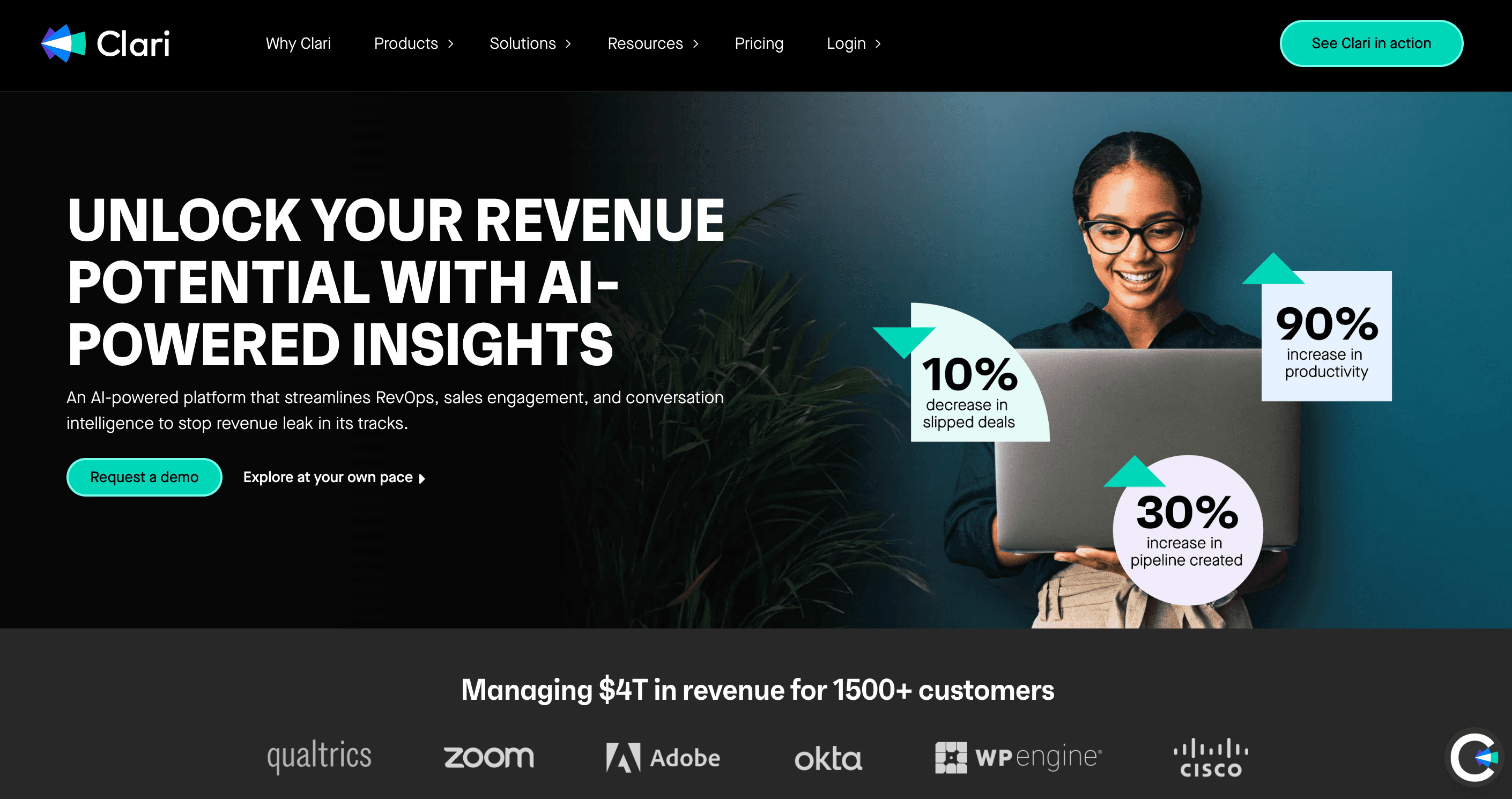
What Clari Does Well
Clari's revenue platform has earned its reputation in the revenue operations space through several key strengths. The platform excels in AI-powered forecasting and offers comprehensive pipeline management capabilities that many enterprise organizations find valuable. Its revenue intelligence features and detailed activity capture provide deep insights into sales processes, while historical trend analysis helps inform strategic decisions. These strengths explain why Clari is frequently benchmarked against other Clari competitors in the RevOps market.
Clari's Main Drawbacks
Despite its capabilities, several factors lead companies to seek alternatives. The platform’s enterprise-focused pricing model often proves prohibitive for mid-market companies, while the complex implementation process requires significant resources many organizations struggle to allocate. Sales teams frequently face a steep learning curve, and the limited native Clari integrations with HubSpot create friction for companies invested in that ecosystem. Additionally, rigid customization options and hidden costs for advanced features can impact the platform’s overall value proposition, especially when addressing issues like revenue leaks.
Why Companies Explore Alternatives
Because of these challenges, many businesses look at Clari competitors that offer faster time-to-value, lower total cost of ownership, and more flexible integrations. Forecastio stands out in this space by offering a HubSpot-native experience, AI-driven forecasting with up to 95% accuracy, and quick implementation measured in days rather than months. Unlike the limited Clari integrations with HubSpot, Forecastio leverages deal stage data directly from your CRM, ensuring seamless adoption for teams already embedded in the HubSpot ecosystem. For companies that want enterprise-grade forecasting power without enterprise-level overhead, Forecastio delivers a more accessible alternative.
The Best 15 Clari Alternatives for 2024
1. Forecastio: Best alternative for HubSpot users
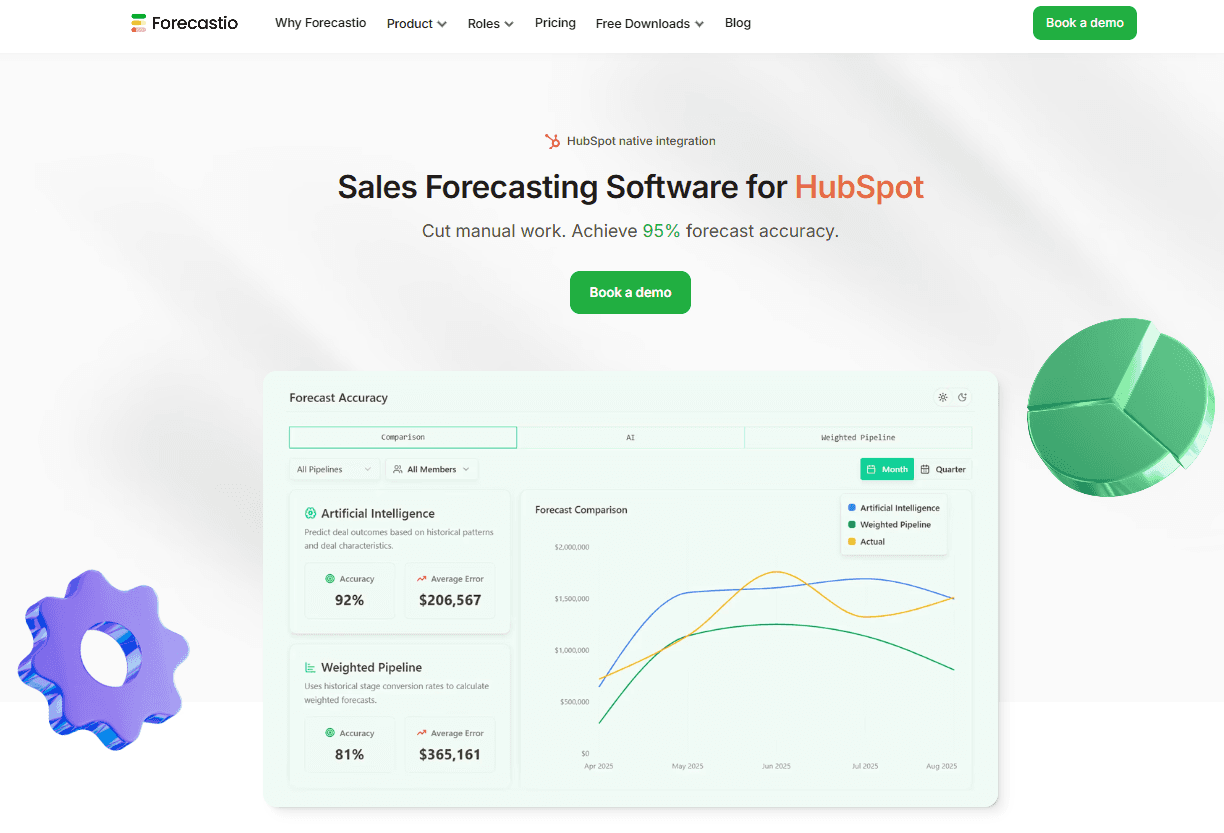
Forecastio is a strong Clari alternative for HubSpot-based sales teams that need advanced, AI-driven sales forecasting without the complexity of enterprise RevOps tools. Among Clari competitors, Forecastio stands out for its focus on forecast accuracy, transparency, and fast time to value.
Advanced AI sales forecasting
Forecastio goes far beyond the standard HubSpot weighted pipeline. It uses machine learning models to assign deal-level probabilities based on multiple signals, including historical deal outcomes, pipeline movement, stage velocity, deal age, and activity patterns. These probabilities are continuously calibrated using historical performance to reflect real conversion behavior.
Forecastio also uses machine learning to predict close dates, identifying unrealistic rep-entered dates and forecasting expected close timing. In practice, these ML-based predictions outperform sales rep close dates by 15–20%, helping teams reduce slippage and improve planning accuracy.
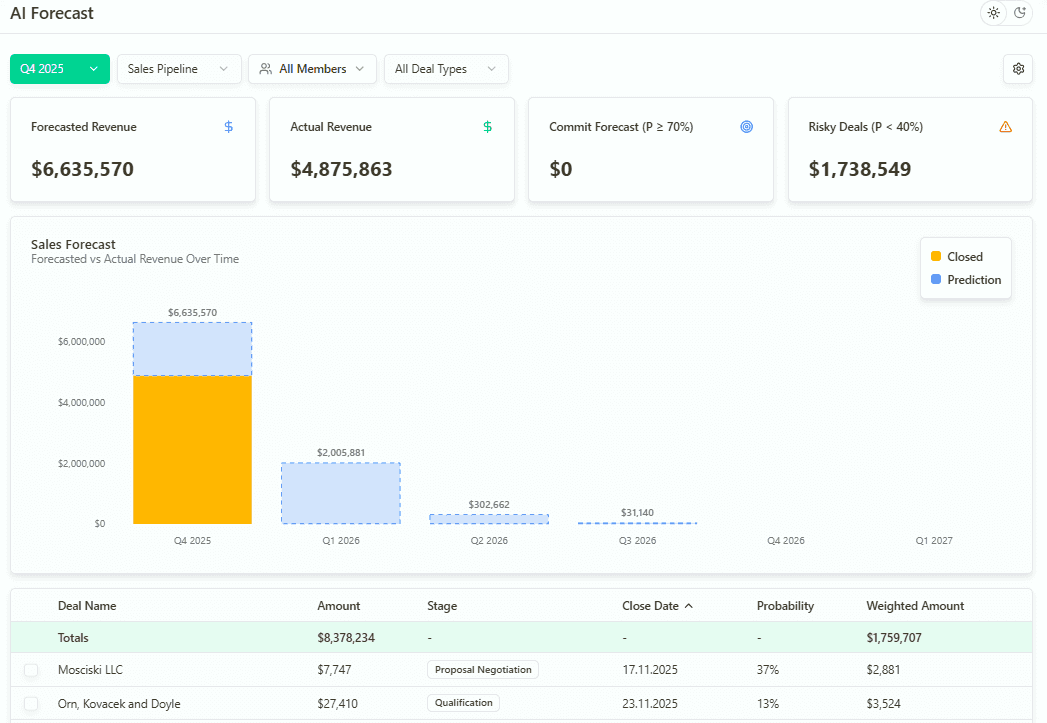
Native HubSpot integration
Forecastio integrates natively with HubSpot and works directly on CRM data. Sales teams stay in their existing HubSpot workflows while Forecastio analyzes pipeline changes and forecasting signals in real time. Deployment is fast and requires no complex setup or external consultants.
Accuracy tracking and comprehensive audit trail
Forecastio treats forecasting as a measurable process, not a one-time snapshot. It continuously tracks forecast accuracy across periods, compares forecasted and actual revenue, and identifies systematic bias over time.
Every forecast change is recorded in a comprehensive audit trail, giving sales leaders full visibility into how forecasts evolved, what changed, and why results differed from expectations. This level of transparency is a key differentiator among Clari alternatives and helps teams build trust in their numbers.
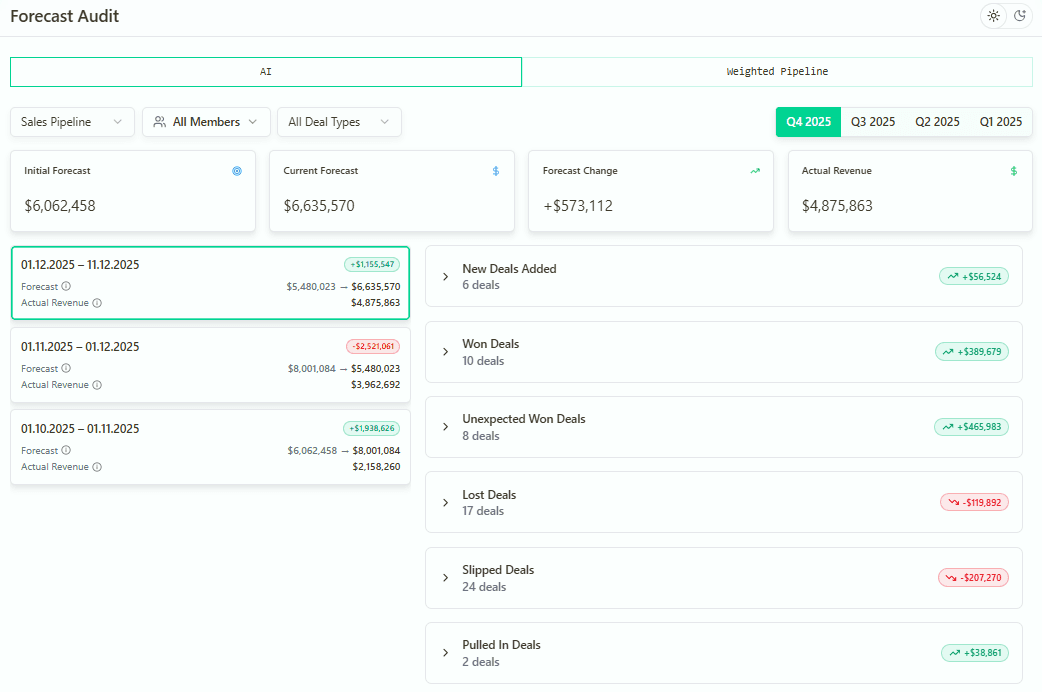
Scenario planning and strategic forecasting
Forecastio allows sales leaders and RevOps teams to model multiple forecasting scenarios without modifying live pipeline data. Teams can test different assumptions, such as setting probability thresholds, excluding high-risk or stalled deals, adjusting close date expectations, or modeling best-case and downside scenarios.
This helps leaders understand how sensitive the forecast is to deal risk and pipeline quality, making Forecastio a practical choice among Clari competitors for planning, board discussions, and revenue decision-making.
Transparent pricing
Forecastio offers transparent pricing with no mandatory implementation fees. Compared to many Clari alternatives, this results in a significantly lower total cost of ownership for mid-market HubSpot teams.

2. Salesforce Sales Cloud
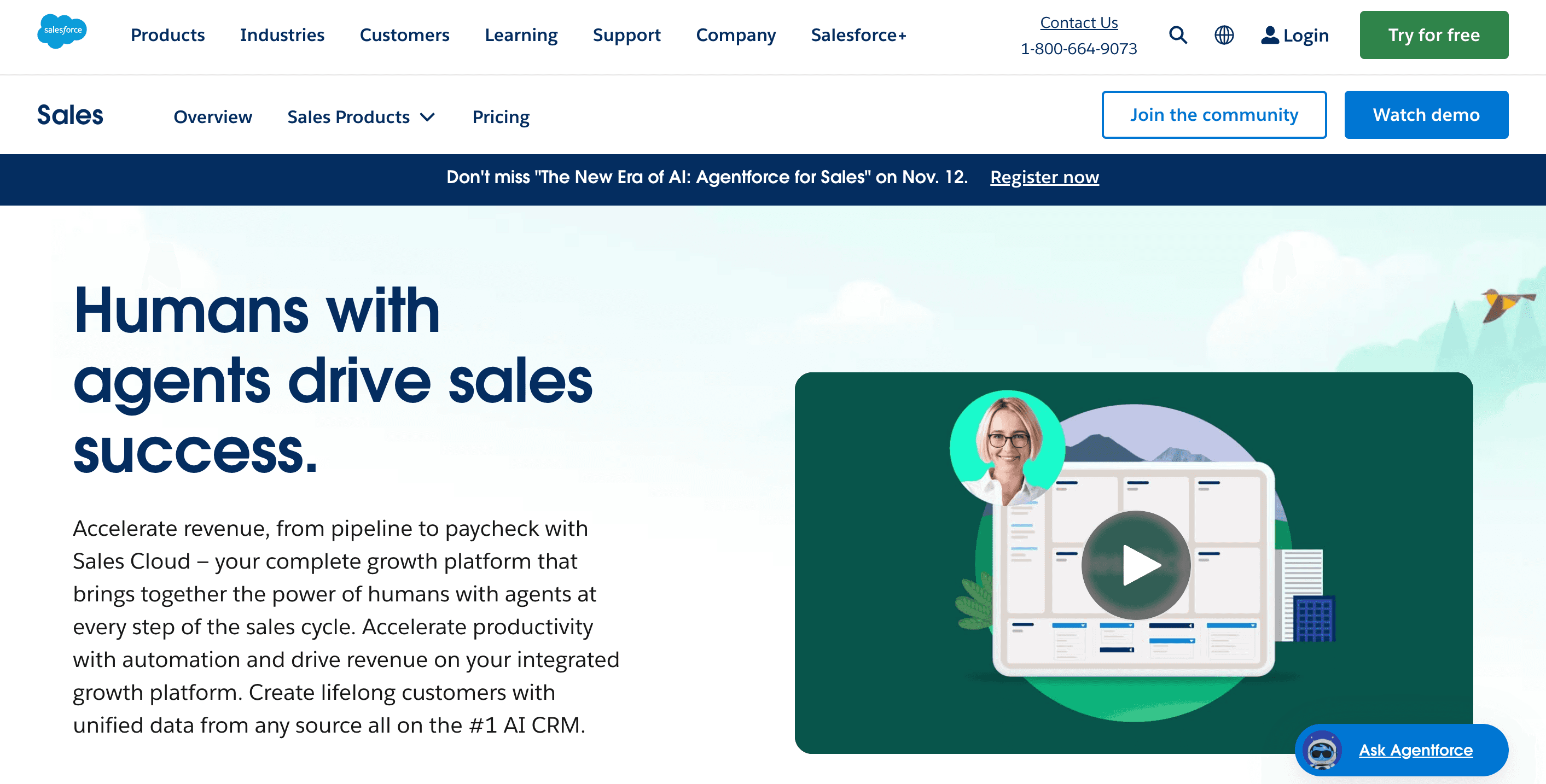
Salesforce Sales Cloud is a robust CRM platform that's designed to manage the entire revenue operation cycle. It offers a range of tools for pipeline management, forecasting, and customer relationship management, making it a good choice for businesses that want to manage sales, marketing, and customer service processes within the revenue management space.
Salesforce Sales Cloud is a complex platform that requires technical savvy to implement and manage. It often needs customization, which can increase the total cost of ownership. You may need to hire a dedicated administrator or consultant to maintain the platform, which adds to the overall cost. While it's a powerful CRM, Salesforce Sales Cloud forecasting capabilities may not be as advanced as Clari's out-of-the-box.
Salesforce features:
Einstein AI-powered analytics and predictions
Advanced territory management
Customizable sales processes and workflows
Opportunity and pipeline management
Mobile-first design
Extensive third-party integrations
Salesforce pricing:
Starter: $25 per user/month
Professional: $100 per user/month
Enterprise: $165 per user/month
Unlimited: $330 per user/month
Einstein 1 Sales: $500 per user/month
Plans are billed annually
Salesforce free trial:
30 days
Pros Salesforce vs Clari:
More comprehensive CRM functionality
Larger ecosystem of integrations and apps
Better customization options for enterprise needs
Stronger mobile capabilities
More extensive reporting options
Cons Salesforce vs Clari:
More complex implementation process
Higher total cost of ownership
Steeper learning curve
Less specialized in revenue forecasting
Requires more administrative overhead
For a comprehensive comparison between two leading CRM platforms, read our HubSpot vs. Salesforce analysis to determine the best fit for your business.
3. People.ai
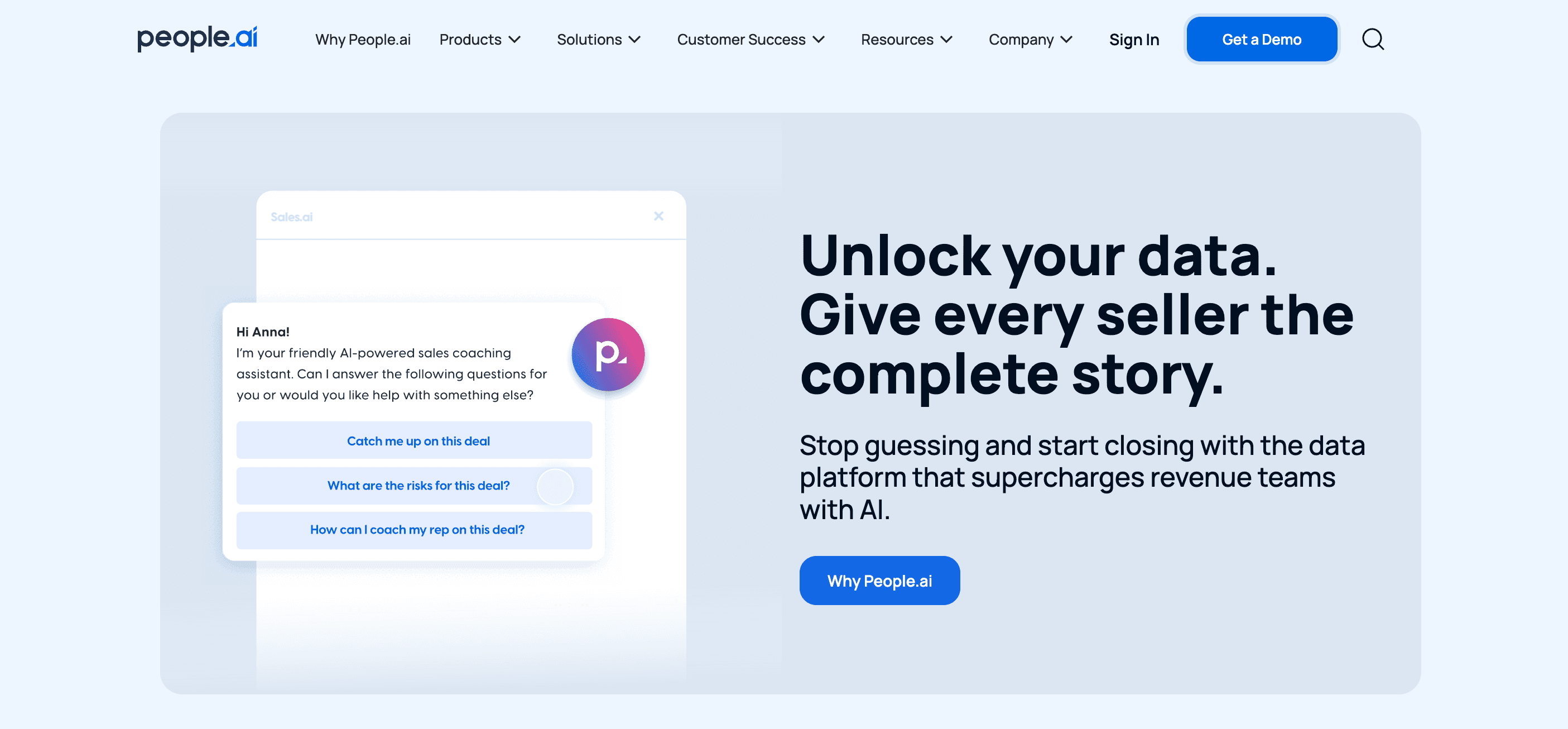
People.ai is a revenue intelligence platform that does a great job of capturing all sales and customer-facing activities. It uses sales pipeline data to give you insights on how to move deals forward and provides team performance analytics. With AI-powered analytics, People.ai offers actionable insights to improve sales productivity.
While People.ai does a great job of capturing and analyzing activity, you may need to integrate it with other tools to get everything you need from a revenue ops standpoint. The AI in People.ai can take some time to learn and adapt, only providing accurate forecasting models once it has access to historical data.
People.ai features:
Automatic activity capture
Buyer journey analytics
Pipeline inspection
Account intelligence
Performance benchmarking
People.ai pricing:
Custom pricing based on organization size
Contact sales for detailed quotes
Enterprise plans available
People.ai free trial:
Demo available upon request
Pros People.ai vs Clari:
Superior activity capture capabilities
More detailed buyer journey analytics
Better sales coaching capabilities
Stronger focus on behavioral analytics
Less manual data entry required
Cons People.ai vs Clari:
Less comprehensive forecasting capabilities
More limited pipeline management tools
Newer platform with fewer integrations
Less established in enterprise space
May require additional tools for complete revenue operations
4. Gong Revenue Intelligence
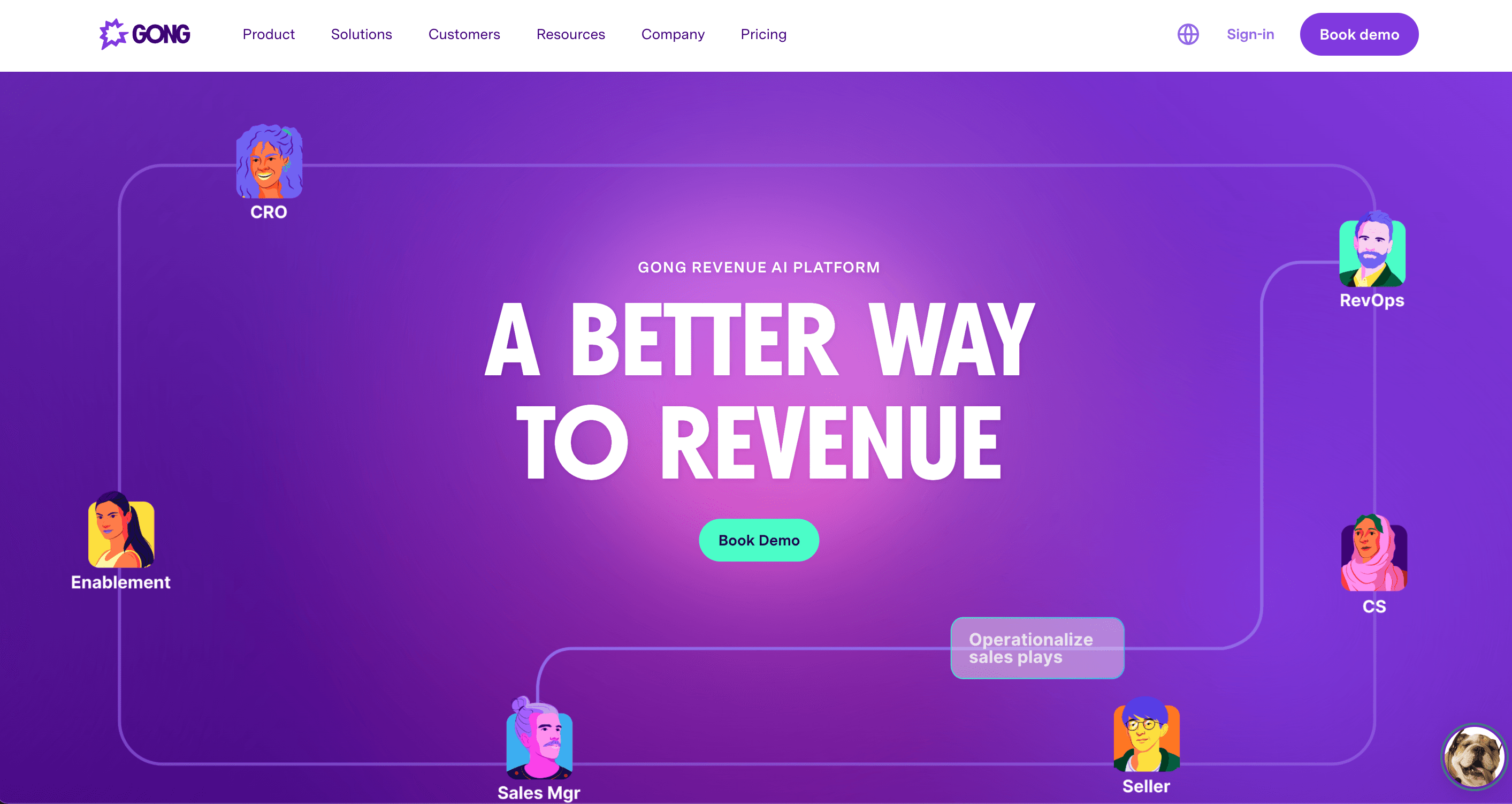
Gong is a revenue intelligence platform that flips the script on traditional revenue intelligence by focusing on conversation analysis instead of activity tracking. Gong uses AI to analyze sales calls, emails, and meetings to give you a direct line into how customers react to your sales teams and the health of those deals.
While Gong does a great job of providing conversation intelligence and deal insights, you may need to integrate it with other tools to get everything you need from a revenue ops standpoint. Adding data from customer success, marketing, and other teams can help you drive efficiency and predictability across sales. Additionally, Gong's recording and analyzing of all calls and meetings may be a privacy and compliance issue for some companies.
Gong features:
Conversation intelligence
Deal pipeline analytics
Reality-based forecasting
Market intelligence
Team coaching tools
Revenue optimization
Gong pricing:
Custom pricing based on team size
Multiple tiers available
Contact sales for quotes
Gong free trial:
Demo available upon request
Pros Gong vs Clari:
Superior conversation insights
Better coaching capabilities
More detailed customer interaction analysis
Stronger reality-based forecasting
Better competitive intelligence
Cons Gong vs Clari:
Less comprehensive pipeline management
More limited CRM integration
Focused primarily on conversation analysis
May require additional tools
Higher privacy considerations
Both Clari and Gong are key players in the sales tech space. Compare their features and benefits in our article: Clari vs. Gong.
5. Revenue Grid
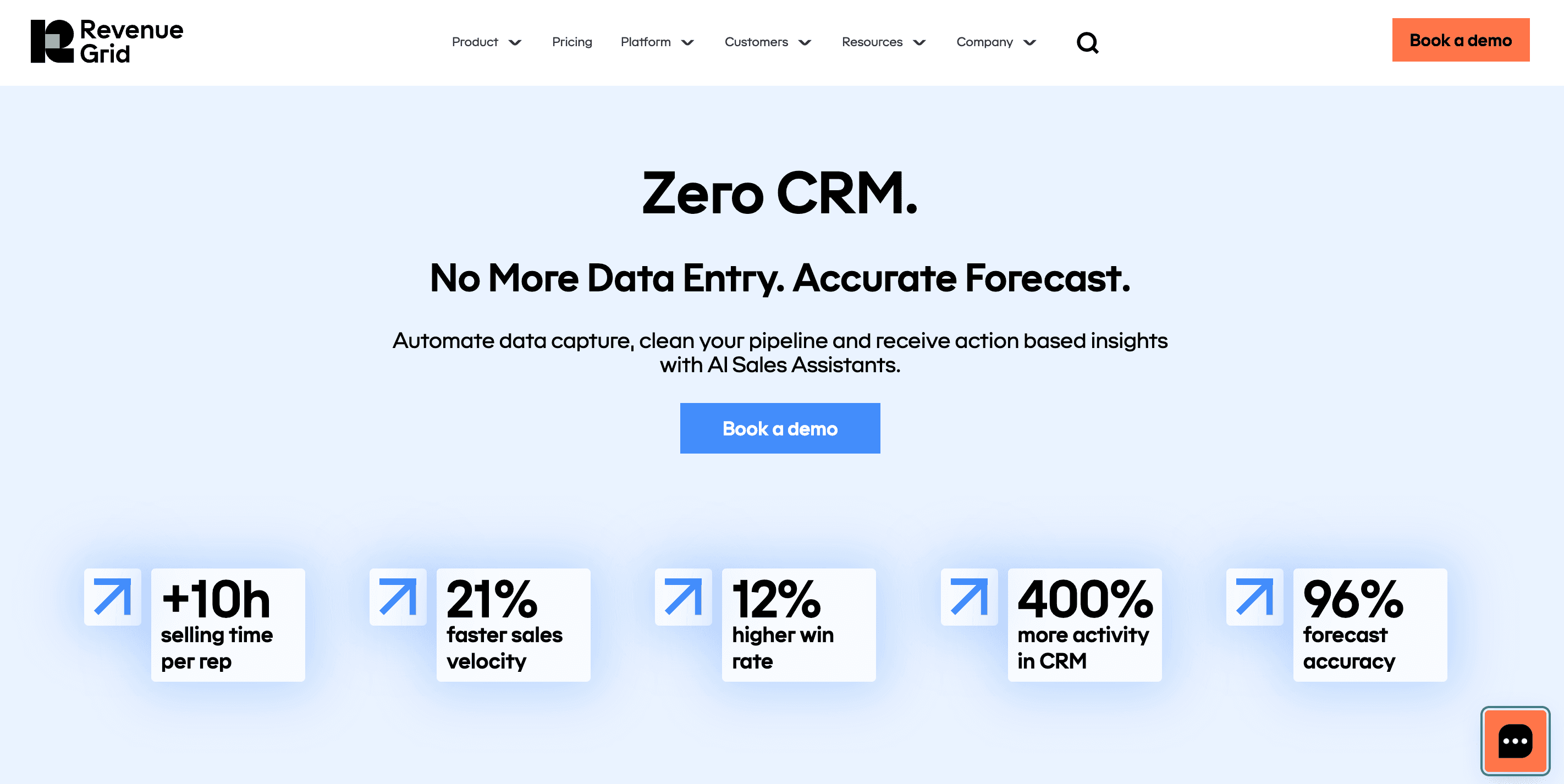
Revenue Grid is a revenue intelligence platform that combines sales engagement with revenue intelligence. It’s a great option if you’re looking for a more holistic approach to pipeline management and forecasting. Revenue Grid is particularly strong in helping sales and marketing work together to move deals through the pipeline, while providing management with deep revenue ops insights to optimize revenue and financial performance.
Revenue Grid enables sales and marketing teams to collaborate more effectively by providing actionable insights that integrate data from various sources, focusing on revenue management.
It is a robust platform that does a lot out of the box, but it can be overwhelming. You’ll need to commit resources to implementing and getting value out of it. A few users have found the interface cluttered and difficult to use, especially for simple tasks. Simplifying the interface and increasing sales reps’ productivity should be a high priority.
Revenue Grid features:
Guided selling
Revenue intelligence
Pipeline visibility
Engagement tracking
Forecast management
Sales playbooks
Customer signals analysis
Integration with major CRMs
Revenue Grid pricing:
Custom pricing
Contact sales for quotes
Annual billing available
Revenue Grid free trial:
Demo available upon request
Pros Revenue Grid vs Clari:
More comprehensive guided selling features
Better sales engagement tools
Stronger focus on revenue signals
More flexible deployment options
Better price point for mid-market
Cons Revenue Grid vs Clari:
More complex interface
Less advanced AI capabilities
Smaller market presence
Less robust mobile experience
More limited enterprise features
6. Aviso AI
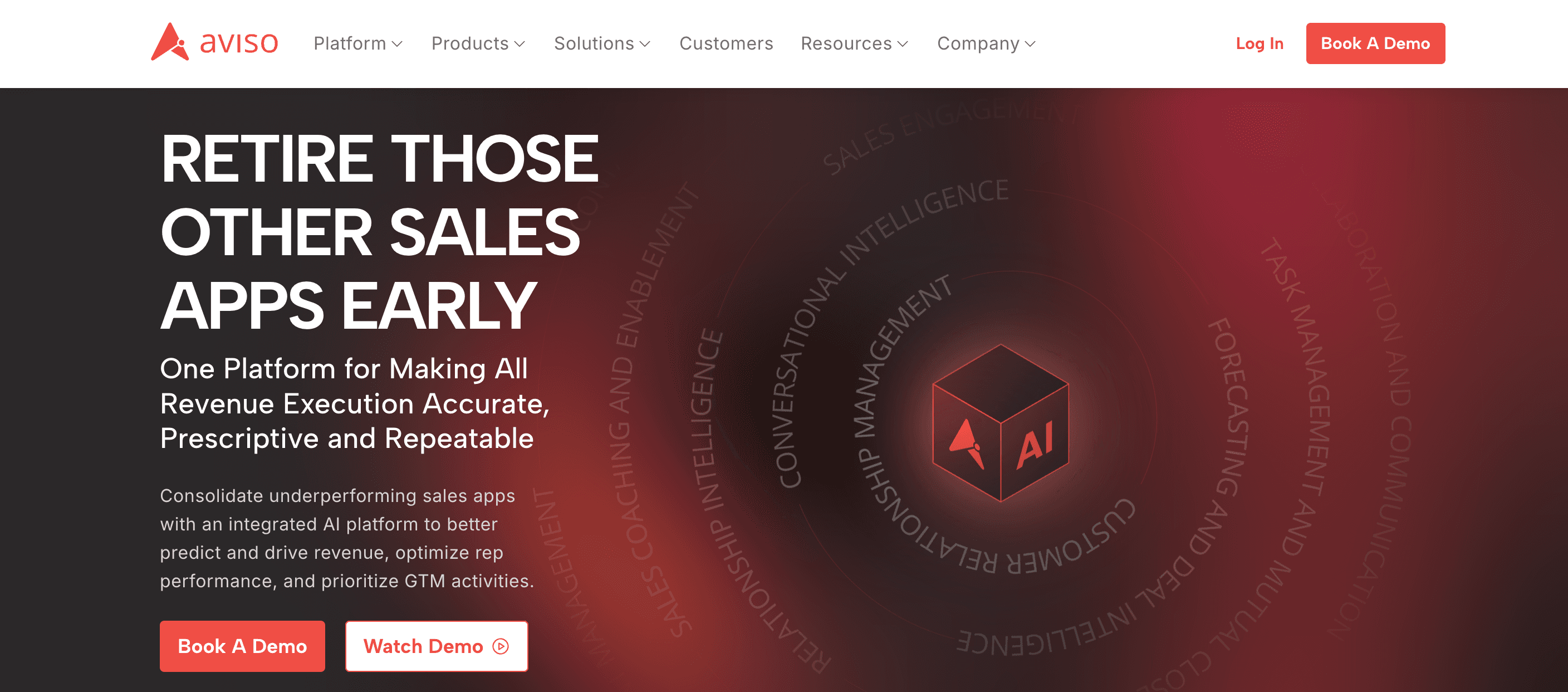
Aviso AI leads the sales forecasting and deal intelligence market, utilizing advanced artificial intelligence to elevate revenue operations. The platform uses machine learning to analyze both historical data and real-time deal patterns to provide accurate forecasts and actionable insights that enable sales teams to predict future revenue outcomes.
Aviso AI also supports revenue teams by providing advanced analytics and insights to improve revenue processes, helping these teams gain visibility into operations, manage risks, and enhance forecast accuracy.
That being said, the platform’s reliance on AI to make predictions does require high-quality historical data to perform well. This could be a limitation for smaller teams that may not have a large data set to draw from. Additionally, some sales teams may find certain features complex and overwhelming, such as the configurability of Aviso AI. While this is a major benefit for larger, global enterprises, it may not be ideal for smaller teams that need simple, out-of-the-box sales forecasting software.

Aviso AI features:
AI-driven forecasting
Deal intelligence
Activity capture
Opportunity scoring
Pipeline optimization
Coaching insights
Custom AI models
Advanced analytics
Aviso AI pricing:
Custom pricing
Contact sales for detailed quotes
Aviso AI free trial:
Demo available upon request
Pros Aviso AI vs Clari:
More advanced AI capabilities
Better predictive analytics
Stronger focus on data science
More detailed opportunity scoring
Superior win probability calculations
Cons Aviso AI vs Clari:
Steeper learning curve
Requires more historical data
Less intuitive interface
More complex setup process
Limited customization options
7. InsightSquared
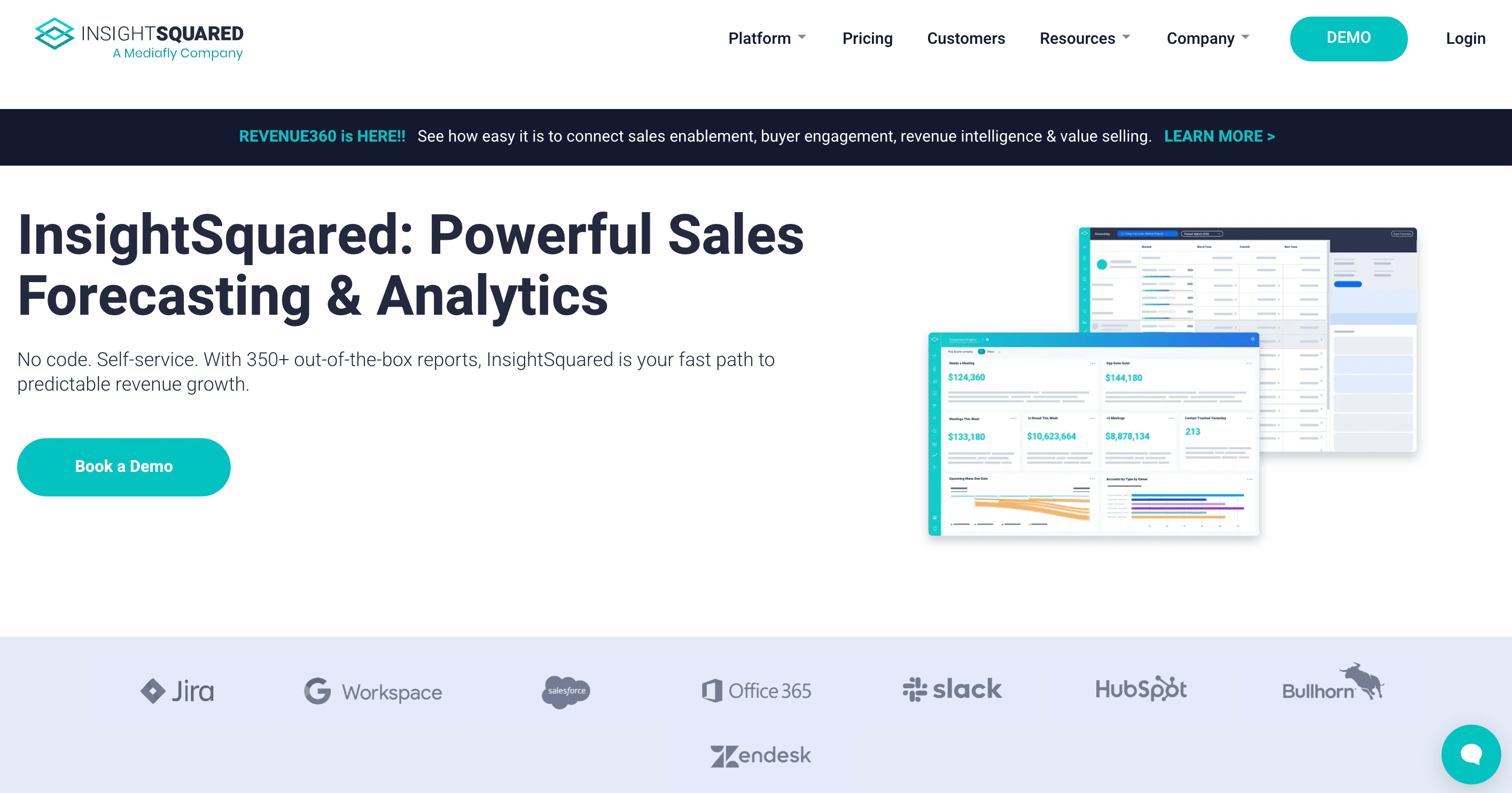
InsightSquared is a data-first revenue intelligence and forecasting platform that’s well-suited for organizations that rely heavily on data to make decisions. This is a great choice for analytics-focused companies or those that want to flip their sales teams from hunter to farmer roles.
The platform excels at taking complex sales data and revenue forecasts and turning it into actionable intelligence through its robust reporting and visualization features. However, many users find that the numerous reports available are overwhelming, and it may be difficult to get all members of your team up to speed on everything the platform has to offer. Adequate training and support are key to getting the most out of InsightSquared.
InsightSquared features:
Advanced analytics
Customizable dashboards
Forecast modeling
Activity tracking
Pipeline analytics
Board reporting
Revenue intelligence
Custom report builder
InsightSquared pricing:
Custom pricing
Premium support options available
Contact sales for detailed quotes
InsightSquared free trial:
Demo available upon request
Pros InsightSquared vs Clari:
More detailed analytics
Better reporting flexibility
Stronger data visualization
More affordable for mid-market
Superior board reporting tools
Cons InsightSquared vs Clari:
Less intuitive user interface
More complex report building
Limited mobile capabilities
Fewer automated insights
Less robust pipeline management
8. Outreach
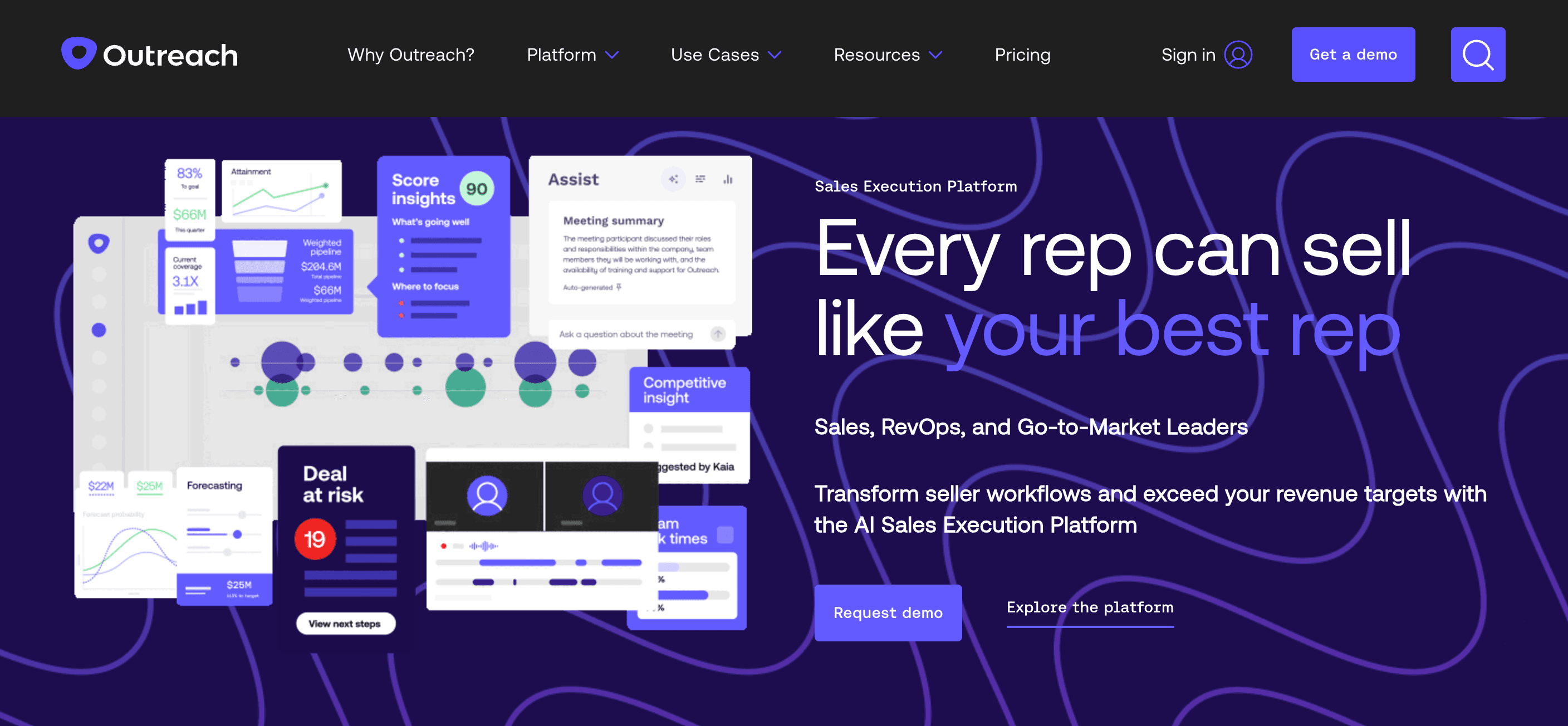
Outreach has evolved from a sales engagement tool into a revenue execution platform that combines sales engagement with revenue intelligence. This new Outreach offers teams the ability to not only monitor their pipeline but drive it with a designed sales process.
However, some companies find they need additional tools to truly operate revenue workflows. Others are priced out of Outreach due to the cost of the full platform.
Outreach features:
Sales engagement sequences
Revenue intelligence
Pipeline management
Conversation intelligence
Deal health insights
Success plans
Team performance tracking
Meeting intelligence
Outreach pricing:
Custom pricing
All plans billed annually
Contact sales for detailed quotes
Outreach free trial:
Demo available upon request
Pros Outreach vs Clari:
Superior sales engagement capabilities
Better sequence management
More comprehensive meeting tools
Stronger focus on execution
Better email integration
Cons Outreach vs Clari:
Less advanced forecasting
More limited pipeline analytics
Higher total cost for full features
More complex setup process
Less robust reporting
9. SalesLoft
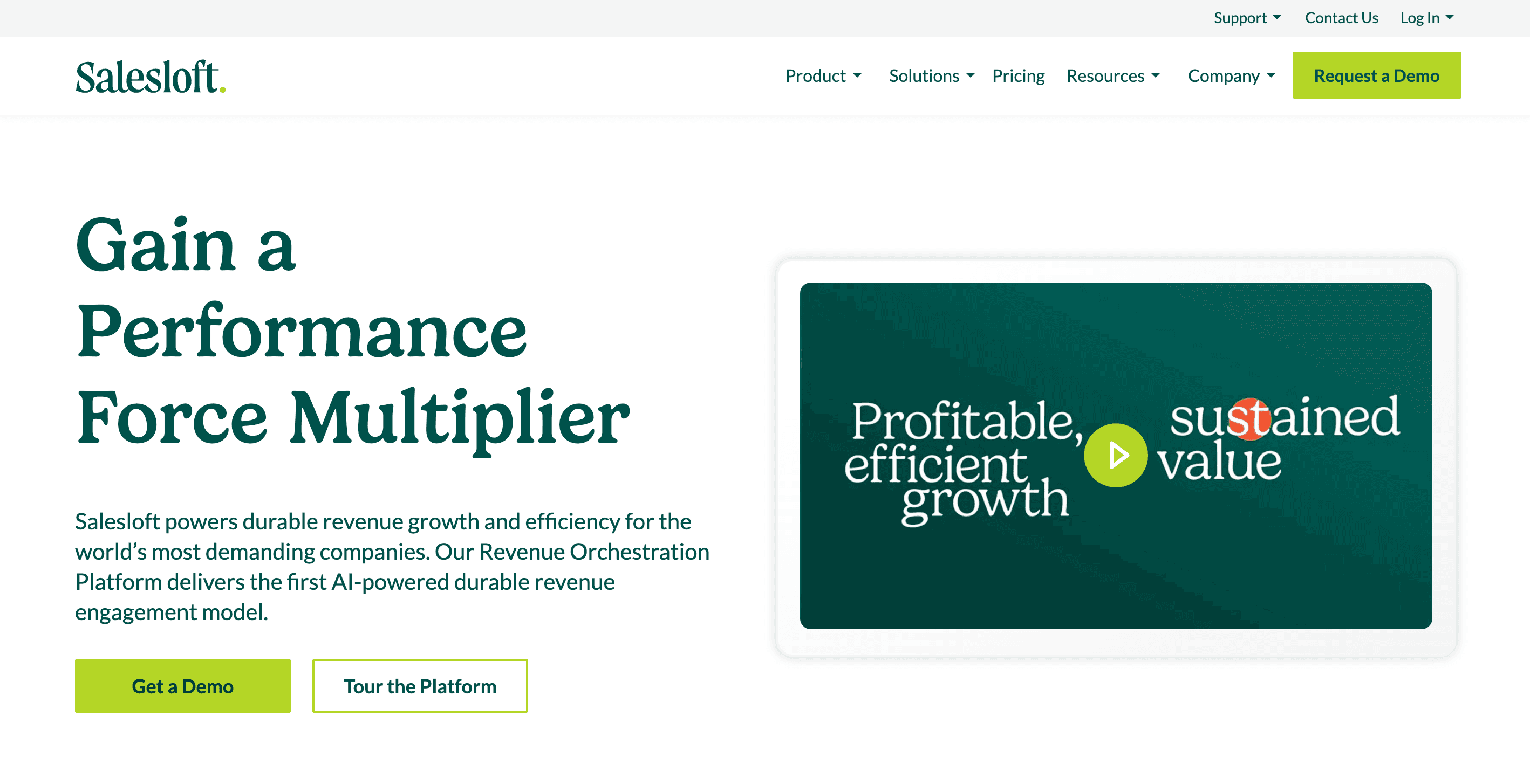
SalesLoft is a revenue operations platform that puts sales engagement and workflow automation first. It's great at helping to streamline sales processes so your sales reps can focus on what's truly important - updating your CRM with notes about customer interactions and moving deals at the speed of your true pipeline.
However, it's limited to sales engagement and you'll likely need to add additional tools to get what you need in a revenue intelligence and forecasting platform.
SalesLoft features:
Sales engagement platform
Revenue workflow automation
Deal management
Conversation intelligence
Analytics and reporting
Cadence automation
Team coaching
Integration ecosystem
SalesLoft pricing:
Custom pricing
Annual commitment required
Contact sales for detailed quotes
SalesLoft free trial:
Demo available upon request
Pros SalesLoft vs Clari:
Better sales engagement tools
Superior workflow automation
More detailed activity tracking
Better email integration
Stronger coaching capabilities
Cons SalesLoft vs Clari:
Less comprehensive forecasting
More limited pipeline analytics
Fewer AI-powered insights
More focused on execution than strategy
Less robust enterprise features
If you're considering Salesloft, you may also want to explore how it compares to Outreach in our article: Outreach vs. Salesloft.
10. BoostUp.ai
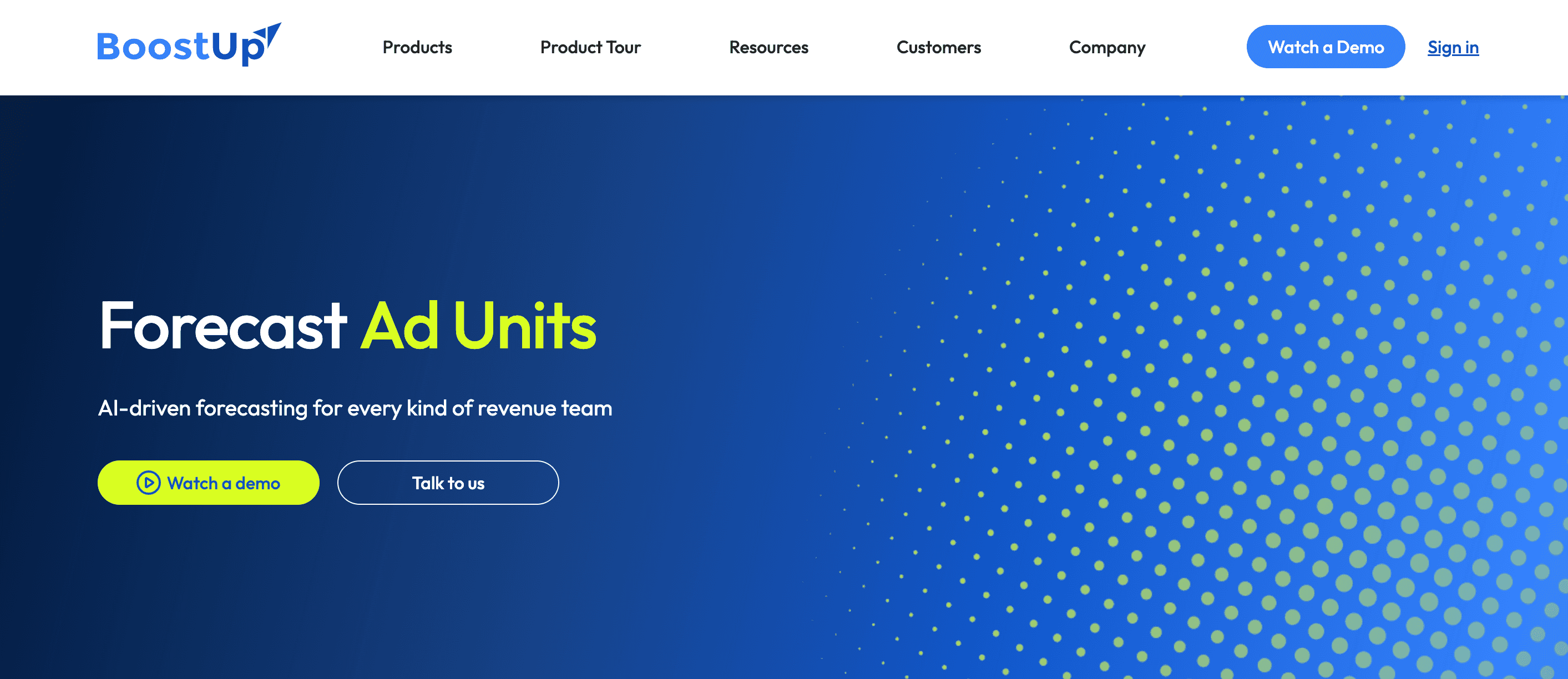
BoostUp.ai is focused on revenue intelligence and forecasting with AI-driven sales forecasts at its heart. Your forecasts are the most important metric to track forecast health and pipeline performance. This platform offers real-time data and automated capture to help you estimate your future growth, properly resource, and set fair quotas.
However, it's a newer player in the market so you may find some limited features compared to more mature options. Customization is also limited to make up for time lost in development.
BoostUp.ai features:
AI-powered forecasting
Revenue intelligence
Deal risk analysis
Activity capture
Pipeline analytics
Conversation intelligence
Engagement scoring
Custom reporting
BoostUp.ai pricing:
Custom pricing
Contact sales for quotes
BoostUp.ai free trial:
Custom demo available
Pros BoostUp.ai vs Clari:
More modern AI architecture
Better real-time insights
More affordable pricing
Faster implementation
More intuitive interface
Cons BoostUp.ai vs Clari:
Less established market presence
Fewer enterprise integrations
More limited customization
Less comprehensive feature set
Smaller customer community
11. HubSpot Sales Hub
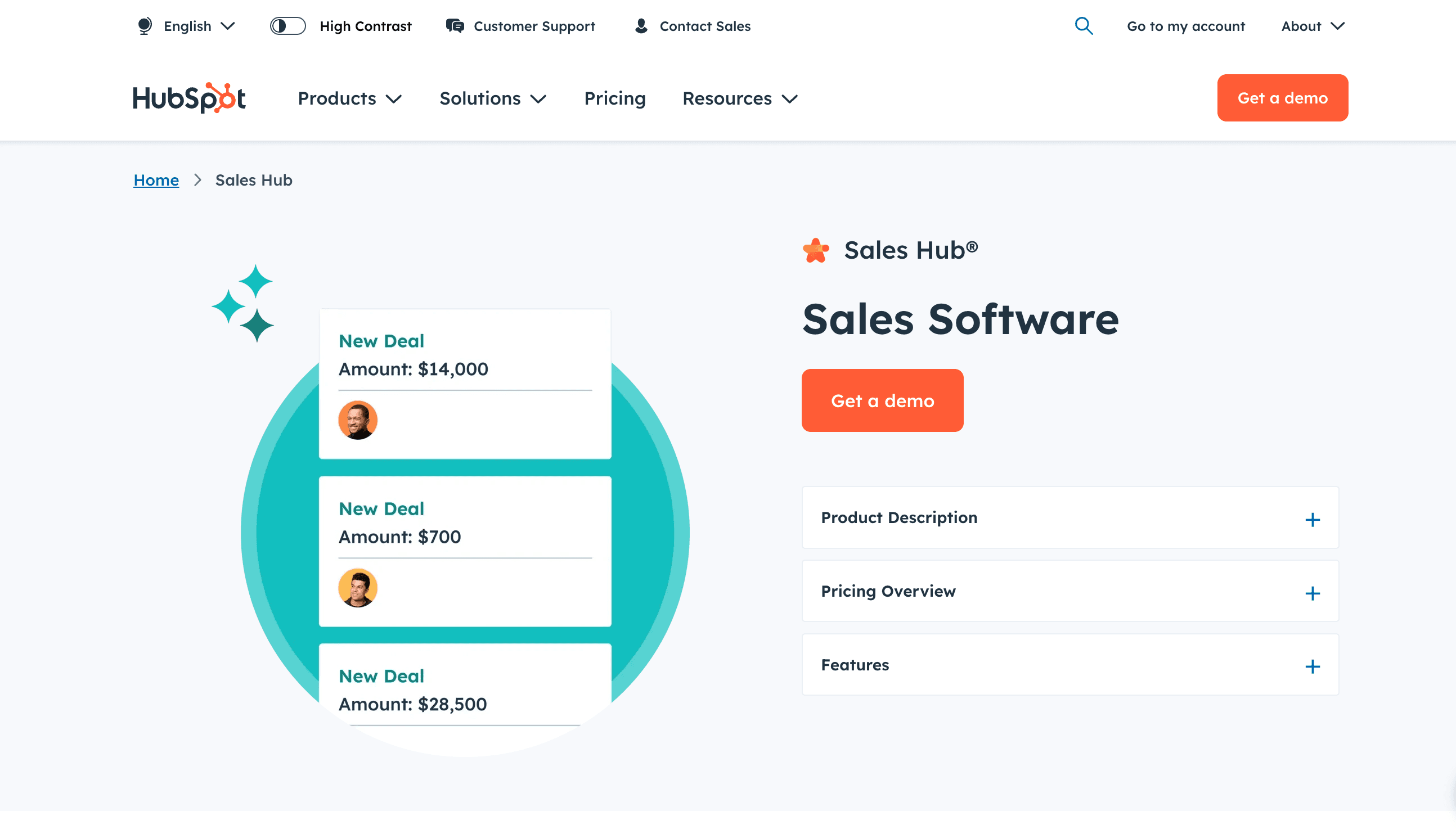
HubSpot Sales Hub is a sales CRM that's packed with pipeline management and forecasting features, and while it may not be a Clari competitor, it's definitely a revenue management alternative worth considering – especially if your company is already invested in the HubSpot ecosystem.
But if you're an enterprise-level team, you may find the forecasting features lacking, especially if you have complex sales operations. You may need something with more power and customization options, like Clari.
Considering switching from HubSpot to another CRM? Read our detailed comparison: Attio vs. HubSpot.

HubSpot Sales Hub features:
Sales CRM
Pipeline management
Forecasting tools
Email tracking
Meeting scheduling
Deal tracking
Sales automation
Custom reporting
HubSpot Sales Hub pricing:
Starter: $20 per user/month
Professional: $100 user/month
Enterprise: $150 user/month
Additional users available
Annual billing discounts
HubSpot Sales Hub free trial:
Yes, free tools available
Pros HubSpot Sales Hub vs Clari:
More user-friendly interface
Better marketing integration
More affordable starting point
Stronger email capabilities
Better small team features
Cons HubSpot Sales Hub vs Clari:
Less sophisticated forecasting
More limited enterprise features
Fewer AI-powered insights
Less specialized for large sales teams
More basic pipeline analytics
12. Collective[i]
![Collective[i]](https://framerusercontent.com/images/FKk0hXigZuwAJiHfjFFrL3eal0.png)
Collectivei is a predictive revenue platform that's built on network effects and artificial intelligence. What's unique about Collectivei is its ability to leverage data from a massive network of users to forecast to. The platform uses anonymized data from its users to create a predictive model that's incredibly accurate, and it provides valuable deal insights to help sales teams close business.
However, the platform's innovative approach might require a shift in how teams think about forecasting, and some organizations might find the network-based insights less relevant for their specific market.
Collective[i] features:
Network-driven insights
Predictive forecasting
Intelligent connections
Deal insights
Virtual deal rooms
Relationship intelligence
Market intelligence
Adaptive forecasting
Collective[i] pricing:
C[i] for Sales™: $750/month per manager
Enterprise: Custom pricing
Contact sales for quotes
Collective[i] free trial:
Free plan available
Pros Collective[i] vs Clari:
More innovative AI approach
Better network insights
Stronger predictive capabilities
Unique market intelligence
More collaborative features
Cons Collective[i] vs Clari:
More complex adoption process
Less traditional forecasting tools
More limited integration options
Less customizable
Steeper learning curve
13. Ebsta Revenue Intelligence
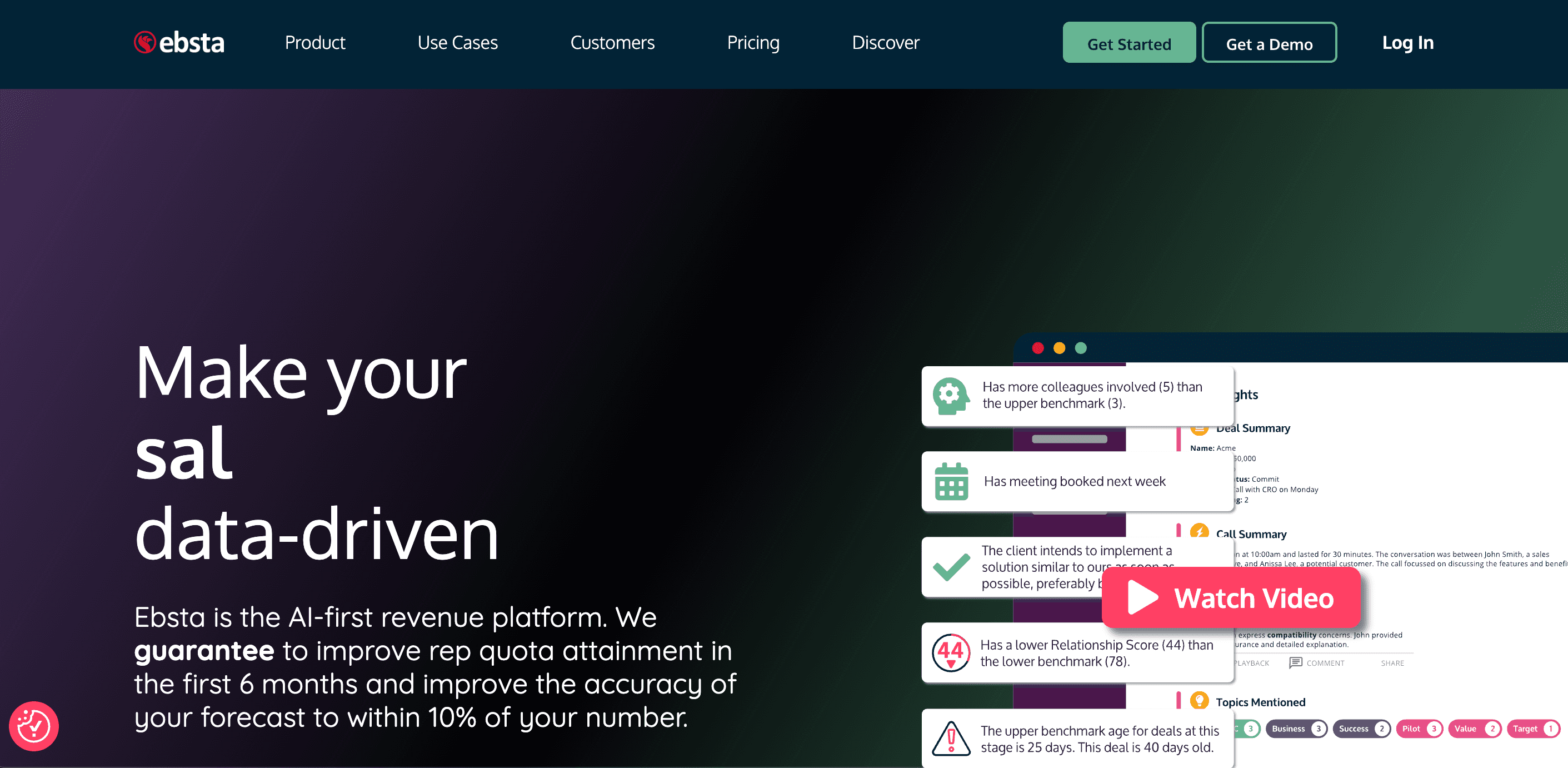
Ebsta is a revenue intelligence platform that's highly integrated with CRM systems. It offers robust relationship analytics and is great at tracking customer engagement and relationship health across your entire account list. However, if you're looking for a more holistic view of your revenue operations, you may need to add in a few more tools to your tech stack. Ebsta doesn't have the advanced forecasting features you'd get with a dedicated forecasting platform like Clari.
Ebsta features:
Relationship intelligence
Activity capture
Engagement scoring
Pipeline analytics
Team tracking
Contact management
Revenue forecasting
CRM enhancement
Ebsta pricing:
Custom pricing
Annual billing available
Contact sales for quotes
Ebsta free trial:
Demo available upon request
Pros Ebsta vs Clari:
Better relationship analytics
More affordable pricing
Stronger CRM integration
Better activity capture
More intuitive setup
Cons Ebsta vs Clari:
Less comprehensive forecasting
More limited pipeline tools
Fewer enterprise features
Less advanced AI capabilities
More limited customization
14. 6sense Revenue AI
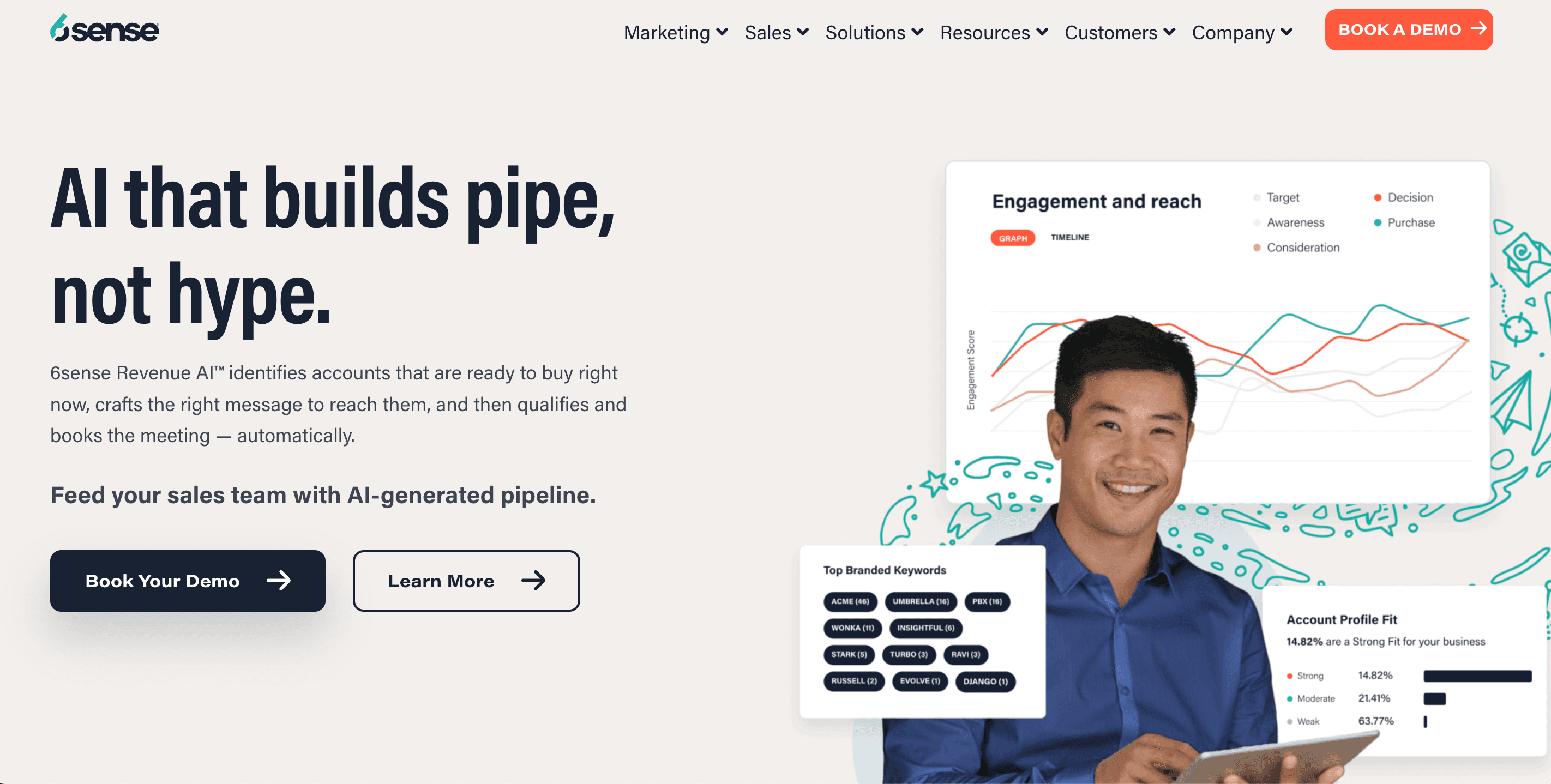
6sense is a revenue management platform (RMP) that's definitely worth monitoring. It's unique value proposition is combining account engagement data with AI-driven intent and viewing it through the lens of revenue intelligence and sales forecasting. The platform's ability to identify and predict buyer intent is particularly powerful for B2B businesses.
However, if your company is smaller and your sales team isn't struggling to scale, 6sense might be overwhelming. It's a powerful platform with a price to match. Mid-market companies looking to invest in their revenue operations may find it out of reach.
6sense features:
Account engagement analytics
Buyer intent data
Predictive insights
Pipeline intelligence
Account-based marketing
Custom segments
Revenue AI
Advanced analytics
6sense pricing:
Platform: Custom pricing
Revenue AI: Custom pricing
Contact sales for packages
Annual contracts required
6sense free trial:
Demo available upon request
Pros 6sense vs Clari:
Better buyer intent insights
Stronger account-based features
More comprehensive market data
Better predictive capabilities
Superior marketing alignment
Cons 6sense vs Clari:
Higher complexity
More expensive
Steeper learning curve
Less focused on pure sales
More marketing-oriented
For seamless ABM integration, explore how 6sense and ZoomInfo compare in our comprehensive analysis.
15. DealHub
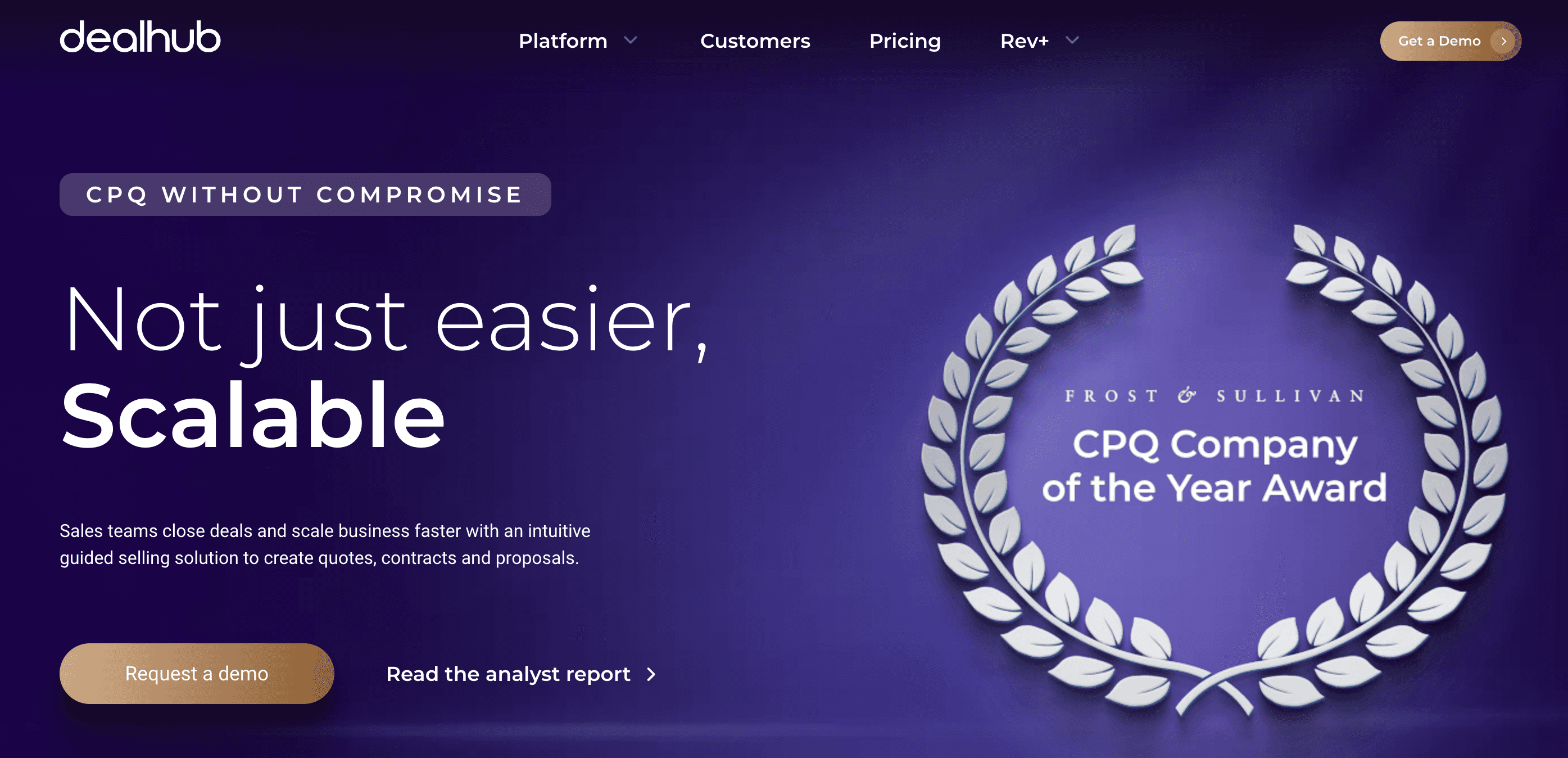
DealHub takes a unique approach to revenue operations by combining CPQ (Configure, Price, Quote) with revenue intelligence and workflow automation. The platform is known for it's ability to quote, manage contracts and provide revenue intelligence.
While we appreciate the holistic approach to revenue operations, DealHub's CPQ focus may be overkill for companies that don't need it. If your company is looking to narrow the sales forecast gap and improve revenue intelligence, the extra features may be distracting.
DealHub features:
Revenue Intelligence
CPQ automation
Digital DealRooms
Contract management
Subscription management
Workflow automation
Proposal generation
Integration ecosystem
DealHub pricing:
Custom pricing
Contact sales for packages
Annual contracts available
DealHub free trial:
Demo available upon request
Pros DealHub vs Clari:
Better CPQ capabilities
More comprehensive document management
Stronger proposal automation
Better pricing configuration
More streamlined workflow automation
Cons DealHub vs Clari:
Less advanced forecasting features
More limited AI capabilities
Newer in revenue intelligence
Less established market presence
More focused on CPQ than pure revenue intelligence
Making Your Final Decision
When choosing between these Clari alternatives, consider these key factors:
Integration Requirements
For HubSpot users, Forecastio offers the most seamless integration and purpose-built functionality. Organizations heavily invested in Salesforce might lean toward Aviso AI or Gong. Consider how well each solution works with your existing tech stack.
Team Size and Complexity
Enterprise organizations with complex sales processes might benefit from comprehensive solutions like Salesforce or 6sense. Mid-market companies often find better value in platforms like Forecastio or Revenue Grid, which offer robust features without overwhelming complexity.
Budget Considerations
While Clari sets a high bar for pricing, alternatives range significantly. Consider not just the initial cost but total ownership cost, including:
Implementation fees
Training requirements
Additional integrations needed
Scaling costs as your team grows
Core Needs
Focus on your primary pain points:
Need better forecasting accuracy? Consider Forecastio or Aviso AI
Want deeper conversation insights? Look at Gong or People.ai
Need improved sales engagement? Explore Outreach or SalesLoft
Require better pipeline management? Evaluate Revenue Grid or InsightSquared
Require better one-on-one sales meetings? Book a demo with Forecastio to see how it works in action.
If you're evaluating commission management solutions, our comparison of Spiff vs. CaptivateIQ offers valuable insights.
Conclusion
The revenue operations space is evolving quickly and while Clari is a great option, there are many other solid alternatives to consider. If you're on the HubSpot platform, Forecastio is a great alternative that offers similar functionality with easy integration and a competitive price. At the end of the day, it really depends on your specific needs and tech stack.
It's also important to note that the right tool isn't always the one with the most features. It's the one that works with your sales team's workflow and helps you achieve measurable ROI with more accurate forecasting and better revenue operations.
Frequently Asked Questions
How do I ensure a smooth transition from Clari to a new platform?
Migrating away from Clari and switching to a new revenue platform requires some planning. Here's a good place to start:
Auditing your current data and process
Identifying key workflows you need to replicate
Developing a solid data migration plan
Preparing for team training
Most alternatives offer migration assistance and implementation services to help minimize disruption to your sales ops.
What are the key differences in forecasting methodologies between Clari and its alternatives?
The forecasting models vary greatly from platform to platform. Clari uses a combination of historical data and AI to drive forecasts. Many alternatives use different methodologies:
Forecastio combines AI with real-time HubSpot data and what-if planning for more accurate forecasts. If you're on the HubSpot platform, this is a big deal.
Gong uses conversation intelligence to base forecasts in reality.
Salesforce sticks closely to historical data and pipeline stages.
How do implementation timelines compare?
Implementation times vary based on platform complexity and your organization's size:
Forecastio: 2 minutes integration process and 1-week full implementation
Salesforce Sales Cloud: 3-6 months for full implementation
Revenue Grid: 4-8 weeks average
People.ai: 4-6 weeks typical timeline
Modern platforms like Forecastio often offer faster implementation due to better native integrations and more intuitive setup processes.
What kind of ROI can I expect from switching platforms?
ROI varies by organization, but customers typically report:
25-40% improvement in forecast accuracy
15-30% reduction in pipeline review time
20-35% increase in deal visibility
10-20% improvement in win rates
Forecastio users often see faster ROI due to quicker implementation and better HubSpot integration, with many reporting positive returns within the first quarter.
How do pricing models compare across different platforms?
Pricing structures vary significantly:
Clari: Enterprise pricing, typically starting at $15,000+ annually
Forecastio: Transparent, user-based pricing that scales with analyzed deals, no hidden fees
Salesforce: Complex pricing with multiple tiers and add-ons
People.ai: Custom pricing based on organization size
Consider the total cost of ownership, including implementation, training, and ongoing maintenance costs.
What level of technical expertise is required to manage these platforms?
Technical requirements vary:
Forecastio: Minimal technical expertise needed, intuitive interface
Salesforce: Often requires dedicated admin support
Gong: Moderate technical needs
InsightSquared: Some technical knowledge beneficial
Consider your team's technical capabilities when choosing a platform.
How do mobile capabilities compare across alternatives?
Mobile support varies significantly:
Forecastio: Full-featured mobile access
Salesforce: Comprehensive mobile app but complex
Revenue Grid: Basic mobile functionality
DealHub: Strong mobile capabilities for core features
Consider your team's mobile needs when evaluating platforms.
In today’s fast-paced B2B environment, accurate sales forecasting and efficient revenue operations have become essential for sustainable growth. Clari Revenue Platform has become a cornerstone in revenue management, leveraging AI technologies like RevAI to provide actionable insights and streamline processes for sales, marketing, and customer success teams.
Its features enhance operational efficiency, improve forecasting accuracy, and provide visibility into the revenue pipeline, making it an essential asset to prevent revenue leakage and foster growth. However, many sales leaders are seeking alternatives that better align with their existing tech stack, particularly those using HubSpot as their primary CRM.
This comprehensive guide will help you navigate the landscape of Clari alternatives, with special attention to solutions that seamlessly integrate with HubSpot and deliver superior value for growing sales teams.

What Clari Does Well
Clari's revenue platform has earned its reputation in the revenue operations space through several key strengths. The platform excels in AI-powered forecasting and offers comprehensive pipeline management capabilities that many enterprise organizations find valuable. Its revenue intelligence features and detailed activity capture provide deep insights into sales processes, while historical trend analysis helps inform strategic decisions. These strengths explain why Clari is frequently benchmarked against other Clari competitors in the RevOps market.
Clari's Main Drawbacks
Despite its capabilities, several factors lead companies to seek alternatives. The platform’s enterprise-focused pricing model often proves prohibitive for mid-market companies, while the complex implementation process requires significant resources many organizations struggle to allocate. Sales teams frequently face a steep learning curve, and the limited native Clari integrations with HubSpot create friction for companies invested in that ecosystem. Additionally, rigid customization options and hidden costs for advanced features can impact the platform’s overall value proposition, especially when addressing issues like revenue leaks.
Why Companies Explore Alternatives
Because of these challenges, many businesses look at Clari competitors that offer faster time-to-value, lower total cost of ownership, and more flexible integrations. Forecastio stands out in this space by offering a HubSpot-native experience, AI-driven forecasting with up to 95% accuracy, and quick implementation measured in days rather than months. Unlike the limited Clari integrations with HubSpot, Forecastio leverages deal stage data directly from your CRM, ensuring seamless adoption for teams already embedded in the HubSpot ecosystem. For companies that want enterprise-grade forecasting power without enterprise-level overhead, Forecastio delivers a more accessible alternative.
The Best 15 Clari Alternatives for 2024
1. Forecastio: Best alternative for HubSpot users

Forecastio is a strong Clari alternative for HubSpot-based sales teams that need advanced, AI-driven sales forecasting without the complexity of enterprise RevOps tools. Among Clari competitors, Forecastio stands out for its focus on forecast accuracy, transparency, and fast time to value.
Advanced AI sales forecasting
Forecastio goes far beyond the standard HubSpot weighted pipeline. It uses machine learning models to assign deal-level probabilities based on multiple signals, including historical deal outcomes, pipeline movement, stage velocity, deal age, and activity patterns. These probabilities are continuously calibrated using historical performance to reflect real conversion behavior.
Forecastio also uses machine learning to predict close dates, identifying unrealistic rep-entered dates and forecasting expected close timing. In practice, these ML-based predictions outperform sales rep close dates by 15–20%, helping teams reduce slippage and improve planning accuracy.

Native HubSpot integration
Forecastio integrates natively with HubSpot and works directly on CRM data. Sales teams stay in their existing HubSpot workflows while Forecastio analyzes pipeline changes and forecasting signals in real time. Deployment is fast and requires no complex setup or external consultants.
Accuracy tracking and comprehensive audit trail
Forecastio treats forecasting as a measurable process, not a one-time snapshot. It continuously tracks forecast accuracy across periods, compares forecasted and actual revenue, and identifies systematic bias over time.
Every forecast change is recorded in a comprehensive audit trail, giving sales leaders full visibility into how forecasts evolved, what changed, and why results differed from expectations. This level of transparency is a key differentiator among Clari alternatives and helps teams build trust in their numbers.

Scenario planning and strategic forecasting
Forecastio allows sales leaders and RevOps teams to model multiple forecasting scenarios without modifying live pipeline data. Teams can test different assumptions, such as setting probability thresholds, excluding high-risk or stalled deals, adjusting close date expectations, or modeling best-case and downside scenarios.
This helps leaders understand how sensitive the forecast is to deal risk and pipeline quality, making Forecastio a practical choice among Clari competitors for planning, board discussions, and revenue decision-making.
Transparent pricing
Forecastio offers transparent pricing with no mandatory implementation fees. Compared to many Clari alternatives, this results in a significantly lower total cost of ownership for mid-market HubSpot teams.

2. Salesforce Sales Cloud

Salesforce Sales Cloud is a robust CRM platform that's designed to manage the entire revenue operation cycle. It offers a range of tools for pipeline management, forecasting, and customer relationship management, making it a good choice for businesses that want to manage sales, marketing, and customer service processes within the revenue management space.
Salesforce Sales Cloud is a complex platform that requires technical savvy to implement and manage. It often needs customization, which can increase the total cost of ownership. You may need to hire a dedicated administrator or consultant to maintain the platform, which adds to the overall cost. While it's a powerful CRM, Salesforce Sales Cloud forecasting capabilities may not be as advanced as Clari's out-of-the-box.
Salesforce features:
Einstein AI-powered analytics and predictions
Advanced territory management
Customizable sales processes and workflows
Opportunity and pipeline management
Mobile-first design
Extensive third-party integrations
Salesforce pricing:
Starter: $25 per user/month
Professional: $100 per user/month
Enterprise: $165 per user/month
Unlimited: $330 per user/month
Einstein 1 Sales: $500 per user/month
Plans are billed annually
Salesforce free trial:
30 days
Pros Salesforce vs Clari:
More comprehensive CRM functionality
Larger ecosystem of integrations and apps
Better customization options for enterprise needs
Stronger mobile capabilities
More extensive reporting options
Cons Salesforce vs Clari:
More complex implementation process
Higher total cost of ownership
Steeper learning curve
Less specialized in revenue forecasting
Requires more administrative overhead
For a comprehensive comparison between two leading CRM platforms, read our HubSpot vs. Salesforce analysis to determine the best fit for your business.
3. People.ai

People.ai is a revenue intelligence platform that does a great job of capturing all sales and customer-facing activities. It uses sales pipeline data to give you insights on how to move deals forward and provides team performance analytics. With AI-powered analytics, People.ai offers actionable insights to improve sales productivity.
While People.ai does a great job of capturing and analyzing activity, you may need to integrate it with other tools to get everything you need from a revenue ops standpoint. The AI in People.ai can take some time to learn and adapt, only providing accurate forecasting models once it has access to historical data.
People.ai features:
Automatic activity capture
Buyer journey analytics
Pipeline inspection
Account intelligence
Performance benchmarking
People.ai pricing:
Custom pricing based on organization size
Contact sales for detailed quotes
Enterprise plans available
People.ai free trial:
Demo available upon request
Pros People.ai vs Clari:
Superior activity capture capabilities
More detailed buyer journey analytics
Better sales coaching capabilities
Stronger focus on behavioral analytics
Less manual data entry required
Cons People.ai vs Clari:
Less comprehensive forecasting capabilities
More limited pipeline management tools
Newer platform with fewer integrations
Less established in enterprise space
May require additional tools for complete revenue operations
4. Gong Revenue Intelligence

Gong is a revenue intelligence platform that flips the script on traditional revenue intelligence by focusing on conversation analysis instead of activity tracking. Gong uses AI to analyze sales calls, emails, and meetings to give you a direct line into how customers react to your sales teams and the health of those deals.
While Gong does a great job of providing conversation intelligence and deal insights, you may need to integrate it with other tools to get everything you need from a revenue ops standpoint. Adding data from customer success, marketing, and other teams can help you drive efficiency and predictability across sales. Additionally, Gong's recording and analyzing of all calls and meetings may be a privacy and compliance issue for some companies.
Gong features:
Conversation intelligence
Deal pipeline analytics
Reality-based forecasting
Market intelligence
Team coaching tools
Revenue optimization
Gong pricing:
Custom pricing based on team size
Multiple tiers available
Contact sales for quotes
Gong free trial:
Demo available upon request
Pros Gong vs Clari:
Superior conversation insights
Better coaching capabilities
More detailed customer interaction analysis
Stronger reality-based forecasting
Better competitive intelligence
Cons Gong vs Clari:
Less comprehensive pipeline management
More limited CRM integration
Focused primarily on conversation analysis
May require additional tools
Higher privacy considerations
Both Clari and Gong are key players in the sales tech space. Compare their features and benefits in our article: Clari vs. Gong.
5. Revenue Grid

Revenue Grid is a revenue intelligence platform that combines sales engagement with revenue intelligence. It’s a great option if you’re looking for a more holistic approach to pipeline management and forecasting. Revenue Grid is particularly strong in helping sales and marketing work together to move deals through the pipeline, while providing management with deep revenue ops insights to optimize revenue and financial performance.
Revenue Grid enables sales and marketing teams to collaborate more effectively by providing actionable insights that integrate data from various sources, focusing on revenue management.
It is a robust platform that does a lot out of the box, but it can be overwhelming. You’ll need to commit resources to implementing and getting value out of it. A few users have found the interface cluttered and difficult to use, especially for simple tasks. Simplifying the interface and increasing sales reps’ productivity should be a high priority.
Revenue Grid features:
Guided selling
Revenue intelligence
Pipeline visibility
Engagement tracking
Forecast management
Sales playbooks
Customer signals analysis
Integration with major CRMs
Revenue Grid pricing:
Custom pricing
Contact sales for quotes
Annual billing available
Revenue Grid free trial:
Demo available upon request
Pros Revenue Grid vs Clari:
More comprehensive guided selling features
Better sales engagement tools
Stronger focus on revenue signals
More flexible deployment options
Better price point for mid-market
Cons Revenue Grid vs Clari:
More complex interface
Less advanced AI capabilities
Smaller market presence
Less robust mobile experience
More limited enterprise features
6. Aviso AI

Aviso AI leads the sales forecasting and deal intelligence market, utilizing advanced artificial intelligence to elevate revenue operations. The platform uses machine learning to analyze both historical data and real-time deal patterns to provide accurate forecasts and actionable insights that enable sales teams to predict future revenue outcomes.
Aviso AI also supports revenue teams by providing advanced analytics and insights to improve revenue processes, helping these teams gain visibility into operations, manage risks, and enhance forecast accuracy.
That being said, the platform’s reliance on AI to make predictions does require high-quality historical data to perform well. This could be a limitation for smaller teams that may not have a large data set to draw from. Additionally, some sales teams may find certain features complex and overwhelming, such as the configurability of Aviso AI. While this is a major benefit for larger, global enterprises, it may not be ideal for smaller teams that need simple, out-of-the-box sales forecasting software.

Aviso AI features:
AI-driven forecasting
Deal intelligence
Activity capture
Opportunity scoring
Pipeline optimization
Coaching insights
Custom AI models
Advanced analytics
Aviso AI pricing:
Custom pricing
Contact sales for detailed quotes
Aviso AI free trial:
Demo available upon request
Pros Aviso AI vs Clari:
More advanced AI capabilities
Better predictive analytics
Stronger focus on data science
More detailed opportunity scoring
Superior win probability calculations
Cons Aviso AI vs Clari:
Steeper learning curve
Requires more historical data
Less intuitive interface
More complex setup process
Limited customization options
7. InsightSquared

InsightSquared is a data-first revenue intelligence and forecasting platform that’s well-suited for organizations that rely heavily on data to make decisions. This is a great choice for analytics-focused companies or those that want to flip their sales teams from hunter to farmer roles.
The platform excels at taking complex sales data and revenue forecasts and turning it into actionable intelligence through its robust reporting and visualization features. However, many users find that the numerous reports available are overwhelming, and it may be difficult to get all members of your team up to speed on everything the platform has to offer. Adequate training and support are key to getting the most out of InsightSquared.
InsightSquared features:
Advanced analytics
Customizable dashboards
Forecast modeling
Activity tracking
Pipeline analytics
Board reporting
Revenue intelligence
Custom report builder
InsightSquared pricing:
Custom pricing
Premium support options available
Contact sales for detailed quotes
InsightSquared free trial:
Demo available upon request
Pros InsightSquared vs Clari:
More detailed analytics
Better reporting flexibility
Stronger data visualization
More affordable for mid-market
Superior board reporting tools
Cons InsightSquared vs Clari:
Less intuitive user interface
More complex report building
Limited mobile capabilities
Fewer automated insights
Less robust pipeline management
8. Outreach

Outreach has evolved from a sales engagement tool into a revenue execution platform that combines sales engagement with revenue intelligence. This new Outreach offers teams the ability to not only monitor their pipeline but drive it with a designed sales process.
However, some companies find they need additional tools to truly operate revenue workflows. Others are priced out of Outreach due to the cost of the full platform.
Outreach features:
Sales engagement sequences
Revenue intelligence
Pipeline management
Conversation intelligence
Deal health insights
Success plans
Team performance tracking
Meeting intelligence
Outreach pricing:
Custom pricing
All plans billed annually
Contact sales for detailed quotes
Outreach free trial:
Demo available upon request
Pros Outreach vs Clari:
Superior sales engagement capabilities
Better sequence management
More comprehensive meeting tools
Stronger focus on execution
Better email integration
Cons Outreach vs Clari:
Less advanced forecasting
More limited pipeline analytics
Higher total cost for full features
More complex setup process
Less robust reporting
9. SalesLoft

SalesLoft is a revenue operations platform that puts sales engagement and workflow automation first. It's great at helping to streamline sales processes so your sales reps can focus on what's truly important - updating your CRM with notes about customer interactions and moving deals at the speed of your true pipeline.
However, it's limited to sales engagement and you'll likely need to add additional tools to get what you need in a revenue intelligence and forecasting platform.
SalesLoft features:
Sales engagement platform
Revenue workflow automation
Deal management
Conversation intelligence
Analytics and reporting
Cadence automation
Team coaching
Integration ecosystem
SalesLoft pricing:
Custom pricing
Annual commitment required
Contact sales for detailed quotes
SalesLoft free trial:
Demo available upon request
Pros SalesLoft vs Clari:
Better sales engagement tools
Superior workflow automation
More detailed activity tracking
Better email integration
Stronger coaching capabilities
Cons SalesLoft vs Clari:
Less comprehensive forecasting
More limited pipeline analytics
Fewer AI-powered insights
More focused on execution than strategy
Less robust enterprise features
If you're considering Salesloft, you may also want to explore how it compares to Outreach in our article: Outreach vs. Salesloft.
10. BoostUp.ai

BoostUp.ai is focused on revenue intelligence and forecasting with AI-driven sales forecasts at its heart. Your forecasts are the most important metric to track forecast health and pipeline performance. This platform offers real-time data and automated capture to help you estimate your future growth, properly resource, and set fair quotas.
However, it's a newer player in the market so you may find some limited features compared to more mature options. Customization is also limited to make up for time lost in development.
BoostUp.ai features:
AI-powered forecasting
Revenue intelligence
Deal risk analysis
Activity capture
Pipeline analytics
Conversation intelligence
Engagement scoring
Custom reporting
BoostUp.ai pricing:
Custom pricing
Contact sales for quotes
BoostUp.ai free trial:
Custom demo available
Pros BoostUp.ai vs Clari:
More modern AI architecture
Better real-time insights
More affordable pricing
Faster implementation
More intuitive interface
Cons BoostUp.ai vs Clari:
Less established market presence
Fewer enterprise integrations
More limited customization
Less comprehensive feature set
Smaller customer community
11. HubSpot Sales Hub

HubSpot Sales Hub is a sales CRM that's packed with pipeline management and forecasting features, and while it may not be a Clari competitor, it's definitely a revenue management alternative worth considering – especially if your company is already invested in the HubSpot ecosystem.
But if you're an enterprise-level team, you may find the forecasting features lacking, especially if you have complex sales operations. You may need something with more power and customization options, like Clari.
Considering switching from HubSpot to another CRM? Read our detailed comparison: Attio vs. HubSpot.

HubSpot Sales Hub features:
Sales CRM
Pipeline management
Forecasting tools
Email tracking
Meeting scheduling
Deal tracking
Sales automation
Custom reporting
HubSpot Sales Hub pricing:
Starter: $20 per user/month
Professional: $100 user/month
Enterprise: $150 user/month
Additional users available
Annual billing discounts
HubSpot Sales Hub free trial:
Yes, free tools available
Pros HubSpot Sales Hub vs Clari:
More user-friendly interface
Better marketing integration
More affordable starting point
Stronger email capabilities
Better small team features
Cons HubSpot Sales Hub vs Clari:
Less sophisticated forecasting
More limited enterprise features
Fewer AI-powered insights
Less specialized for large sales teams
More basic pipeline analytics
12. Collective[i]
![Collective[i]](https://framerusercontent.com/images/FKk0hXigZuwAJiHfjFFrL3eal0.png)
Collectivei is a predictive revenue platform that's built on network effects and artificial intelligence. What's unique about Collectivei is its ability to leverage data from a massive network of users to forecast to. The platform uses anonymized data from its users to create a predictive model that's incredibly accurate, and it provides valuable deal insights to help sales teams close business.
However, the platform's innovative approach might require a shift in how teams think about forecasting, and some organizations might find the network-based insights less relevant for their specific market.
Collective[i] features:
Network-driven insights
Predictive forecasting
Intelligent connections
Deal insights
Virtual deal rooms
Relationship intelligence
Market intelligence
Adaptive forecasting
Collective[i] pricing:
C[i] for Sales™: $750/month per manager
Enterprise: Custom pricing
Contact sales for quotes
Collective[i] free trial:
Free plan available
Pros Collective[i] vs Clari:
More innovative AI approach
Better network insights
Stronger predictive capabilities
Unique market intelligence
More collaborative features
Cons Collective[i] vs Clari:
More complex adoption process
Less traditional forecasting tools
More limited integration options
Less customizable
Steeper learning curve
13. Ebsta Revenue Intelligence

Ebsta is a revenue intelligence platform that's highly integrated with CRM systems. It offers robust relationship analytics and is great at tracking customer engagement and relationship health across your entire account list. However, if you're looking for a more holistic view of your revenue operations, you may need to add in a few more tools to your tech stack. Ebsta doesn't have the advanced forecasting features you'd get with a dedicated forecasting platform like Clari.
Ebsta features:
Relationship intelligence
Activity capture
Engagement scoring
Pipeline analytics
Team tracking
Contact management
Revenue forecasting
CRM enhancement
Ebsta pricing:
Custom pricing
Annual billing available
Contact sales for quotes
Ebsta free trial:
Demo available upon request
Pros Ebsta vs Clari:
Better relationship analytics
More affordable pricing
Stronger CRM integration
Better activity capture
More intuitive setup
Cons Ebsta vs Clari:
Less comprehensive forecasting
More limited pipeline tools
Fewer enterprise features
Less advanced AI capabilities
More limited customization
14. 6sense Revenue AI

6sense is a revenue management platform (RMP) that's definitely worth monitoring. It's unique value proposition is combining account engagement data with AI-driven intent and viewing it through the lens of revenue intelligence and sales forecasting. The platform's ability to identify and predict buyer intent is particularly powerful for B2B businesses.
However, if your company is smaller and your sales team isn't struggling to scale, 6sense might be overwhelming. It's a powerful platform with a price to match. Mid-market companies looking to invest in their revenue operations may find it out of reach.
6sense features:
Account engagement analytics
Buyer intent data
Predictive insights
Pipeline intelligence
Account-based marketing
Custom segments
Revenue AI
Advanced analytics
6sense pricing:
Platform: Custom pricing
Revenue AI: Custom pricing
Contact sales for packages
Annual contracts required
6sense free trial:
Demo available upon request
Pros 6sense vs Clari:
Better buyer intent insights
Stronger account-based features
More comprehensive market data
Better predictive capabilities
Superior marketing alignment
Cons 6sense vs Clari:
Higher complexity
More expensive
Steeper learning curve
Less focused on pure sales
More marketing-oriented
For seamless ABM integration, explore how 6sense and ZoomInfo compare in our comprehensive analysis.
15. DealHub

DealHub takes a unique approach to revenue operations by combining CPQ (Configure, Price, Quote) with revenue intelligence and workflow automation. The platform is known for it's ability to quote, manage contracts and provide revenue intelligence.
While we appreciate the holistic approach to revenue operations, DealHub's CPQ focus may be overkill for companies that don't need it. If your company is looking to narrow the sales forecast gap and improve revenue intelligence, the extra features may be distracting.
DealHub features:
Revenue Intelligence
CPQ automation
Digital DealRooms
Contract management
Subscription management
Workflow automation
Proposal generation
Integration ecosystem
DealHub pricing:
Custom pricing
Contact sales for packages
Annual contracts available
DealHub free trial:
Demo available upon request
Pros DealHub vs Clari:
Better CPQ capabilities
More comprehensive document management
Stronger proposal automation
Better pricing configuration
More streamlined workflow automation
Cons DealHub vs Clari:
Less advanced forecasting features
More limited AI capabilities
Newer in revenue intelligence
Less established market presence
More focused on CPQ than pure revenue intelligence
Making Your Final Decision
When choosing between these Clari alternatives, consider these key factors:
Integration Requirements
For HubSpot users, Forecastio offers the most seamless integration and purpose-built functionality. Organizations heavily invested in Salesforce might lean toward Aviso AI or Gong. Consider how well each solution works with your existing tech stack.
Team Size and Complexity
Enterprise organizations with complex sales processes might benefit from comprehensive solutions like Salesforce or 6sense. Mid-market companies often find better value in platforms like Forecastio or Revenue Grid, which offer robust features without overwhelming complexity.
Budget Considerations
While Clari sets a high bar for pricing, alternatives range significantly. Consider not just the initial cost but total ownership cost, including:
Implementation fees
Training requirements
Additional integrations needed
Scaling costs as your team grows
Core Needs
Focus on your primary pain points:
Need better forecasting accuracy? Consider Forecastio or Aviso AI
Want deeper conversation insights? Look at Gong or People.ai
Need improved sales engagement? Explore Outreach or SalesLoft
Require better pipeline management? Evaluate Revenue Grid or InsightSquared
Require better one-on-one sales meetings? Book a demo with Forecastio to see how it works in action.
If you're evaluating commission management solutions, our comparison of Spiff vs. CaptivateIQ offers valuable insights.
Conclusion
The revenue operations space is evolving quickly and while Clari is a great option, there are many other solid alternatives to consider. If you're on the HubSpot platform, Forecastio is a great alternative that offers similar functionality with easy integration and a competitive price. At the end of the day, it really depends on your specific needs and tech stack.
It's also important to note that the right tool isn't always the one with the most features. It's the one that works with your sales team's workflow and helps you achieve measurable ROI with more accurate forecasting and better revenue operations.
Frequently Asked Questions
How do I ensure a smooth transition from Clari to a new platform?
Migrating away from Clari and switching to a new revenue platform requires some planning. Here's a good place to start:
Auditing your current data and process
Identifying key workflows you need to replicate
Developing a solid data migration plan
Preparing for team training
Most alternatives offer migration assistance and implementation services to help minimize disruption to your sales ops.
What are the key differences in forecasting methodologies between Clari and its alternatives?
The forecasting models vary greatly from platform to platform. Clari uses a combination of historical data and AI to drive forecasts. Many alternatives use different methodologies:
Forecastio combines AI with real-time HubSpot data and what-if planning for more accurate forecasts. If you're on the HubSpot platform, this is a big deal.
Gong uses conversation intelligence to base forecasts in reality.
Salesforce sticks closely to historical data and pipeline stages.
How do implementation timelines compare?
Implementation times vary based on platform complexity and your organization's size:
Forecastio: 2 minutes integration process and 1-week full implementation
Salesforce Sales Cloud: 3-6 months for full implementation
Revenue Grid: 4-8 weeks average
People.ai: 4-6 weeks typical timeline
Modern platforms like Forecastio often offer faster implementation due to better native integrations and more intuitive setup processes.
What kind of ROI can I expect from switching platforms?
ROI varies by organization, but customers typically report:
25-40% improvement in forecast accuracy
15-30% reduction in pipeline review time
20-35% increase in deal visibility
10-20% improvement in win rates
Forecastio users often see faster ROI due to quicker implementation and better HubSpot integration, with many reporting positive returns within the first quarter.
How do pricing models compare across different platforms?
Pricing structures vary significantly:
Clari: Enterprise pricing, typically starting at $15,000+ annually
Forecastio: Transparent, user-based pricing that scales with analyzed deals, no hidden fees
Salesforce: Complex pricing with multiple tiers and add-ons
People.ai: Custom pricing based on organization size
Consider the total cost of ownership, including implementation, training, and ongoing maintenance costs.
What level of technical expertise is required to manage these platforms?
Technical requirements vary:
Forecastio: Minimal technical expertise needed, intuitive interface
Salesforce: Often requires dedicated admin support
Gong: Moderate technical needs
InsightSquared: Some technical knowledge beneficial
Consider your team's technical capabilities when choosing a platform.
How do mobile capabilities compare across alternatives?
Mobile support varies significantly:
Forecastio: Full-featured mobile access
Salesforce: Comprehensive mobile app but complex
Revenue Grid: Basic mobile functionality
DealHub: Strong mobile capabilities for core features
Consider your team's mobile needs when evaluating platforms.
Share:

Dmytro is a seasoned marketing professional with over 10 years in the B2B and startup ecosystem. He is passionate about helping companies better plan their revenue goals, improve forecast accuracy, and proactively address performance bottlenecks or seize growth opportunities.
Dmytro is a seasoned marketing professional with over 10 years in the B2B and startup ecosystem. He is passionate about helping companies better plan their revenue goals, improve forecast accuracy, and proactively address performance bottlenecks or seize growth opportunities.
Related articles
Sales Forecasting
Dec 15, 2025
7 min
Revenue Operations
Dec 11, 2025
13 min
HubSpot Best Practices
Nov 30, 2025
8 min
Sales Forecasting
Dec 15, 2025
7 min
Revenue Operations
Dec 11, 2025
13 min
Sales Forecasting
Dec 15, 2025
7 min
Revenue Operations
Dec 11, 2025
13 min
Sales Planning
Sales Forecasting
Sales Performance Insights
Sales Planning
Sales Forecasting
Sales Performance Insights
Sales Planning
Sales Forecasting
Sales Performance Insights
© 2025 Forecastio, All rights reserved.
Sales Planning
Sales Forecasting
Sales Performance Insights
Sales Planning
Sales Forecasting
Sales Performance Insights
Sales Planning
Sales Forecasting
Sales Performance Insights
© 2025 Forecastio, All rights reserved.
Sales Planning
Sales Forecasting
Sales Performance Insights
Sales Planning
Sales Forecasting
Sales Performance Insights
Sales Planning
Sales Forecasting
Sales Performance Insights
© 2025 Forecastio, All rights reserved.

